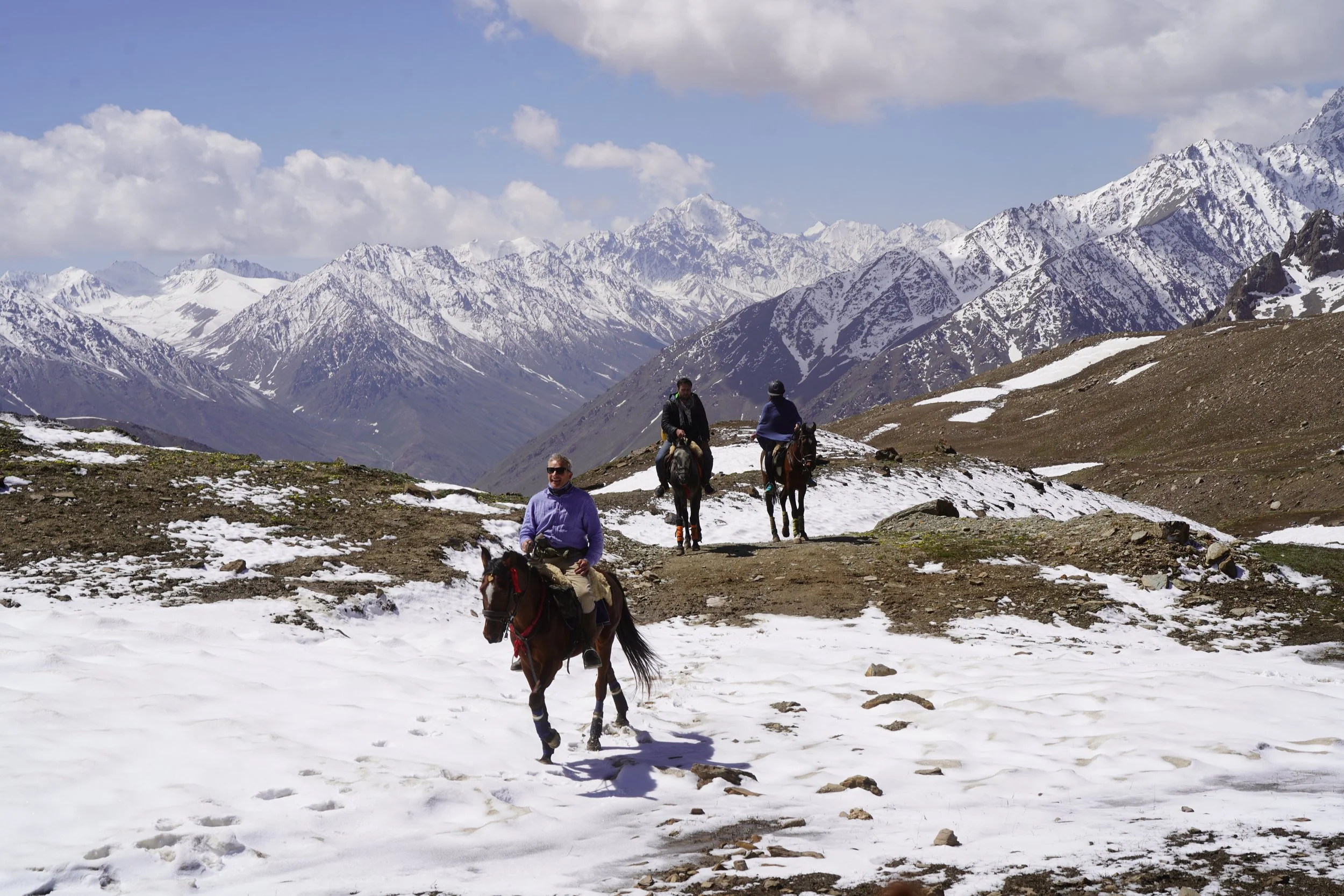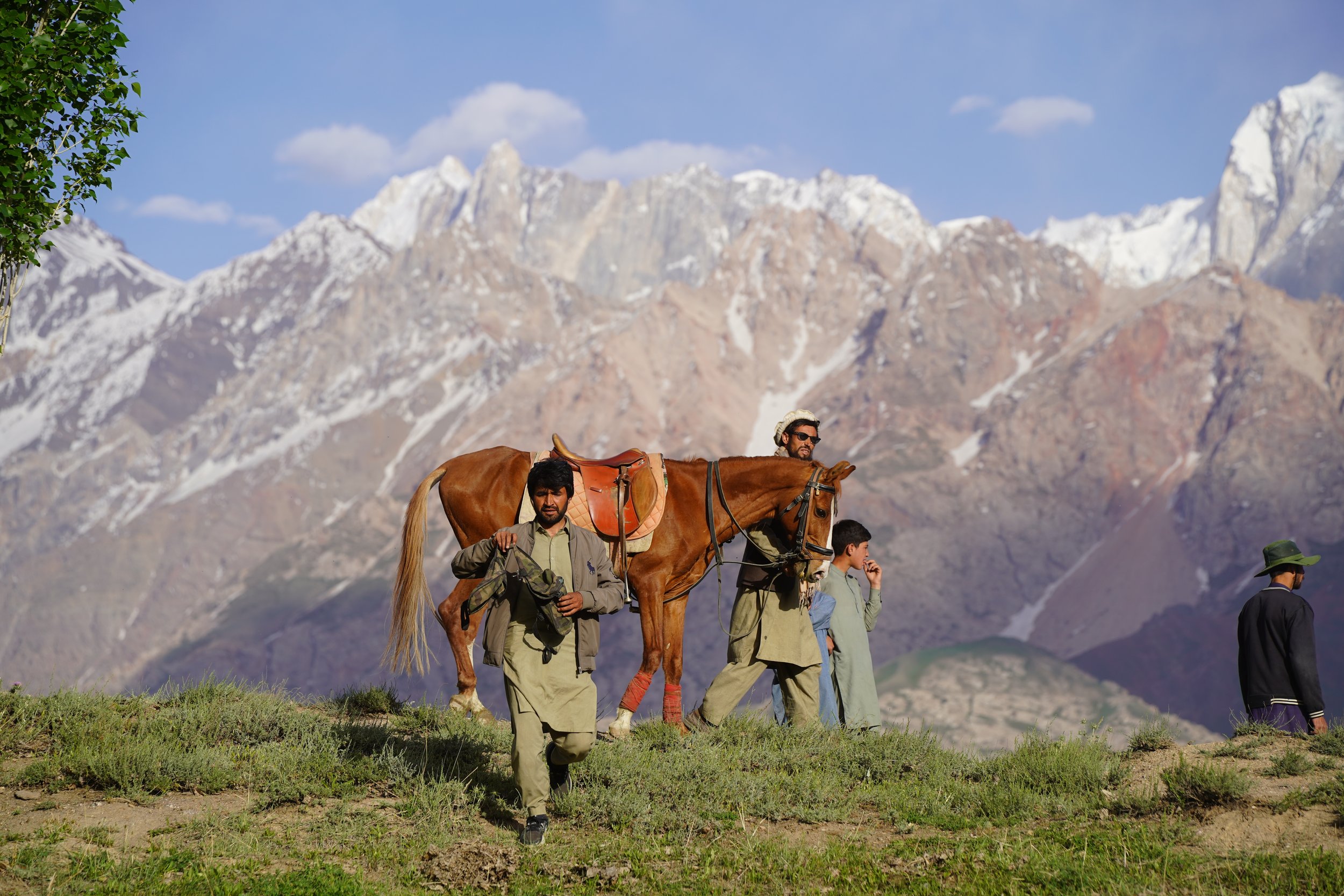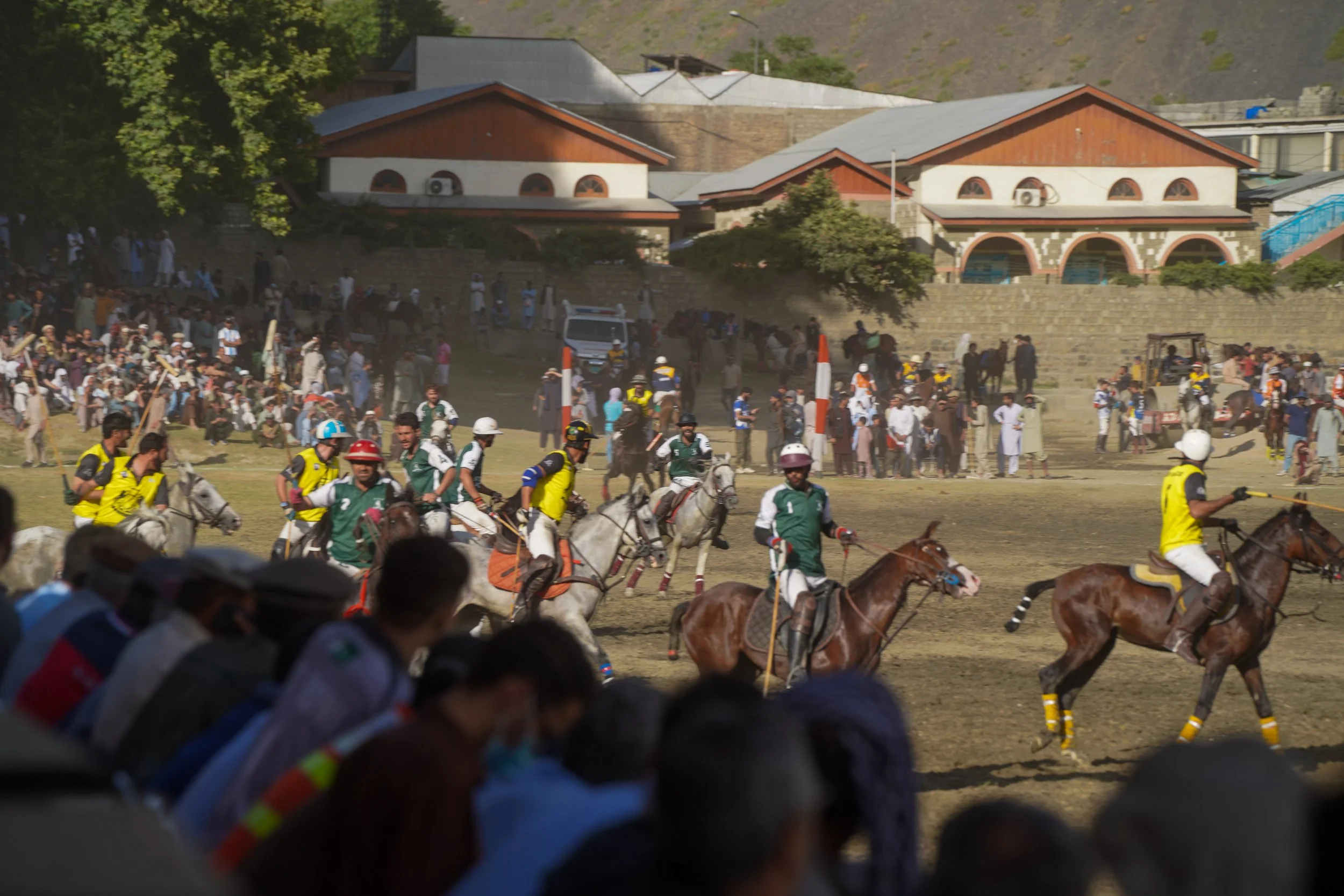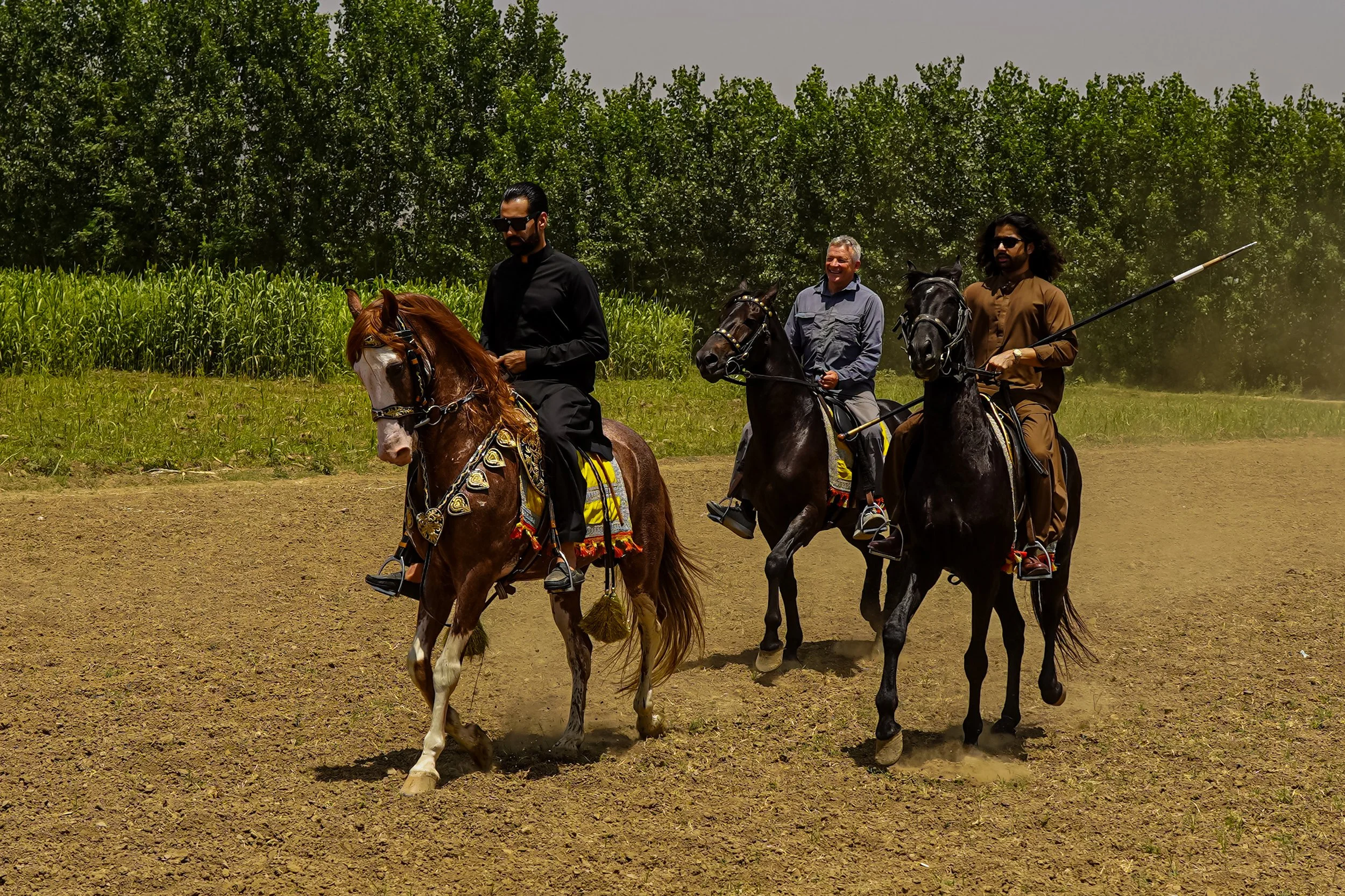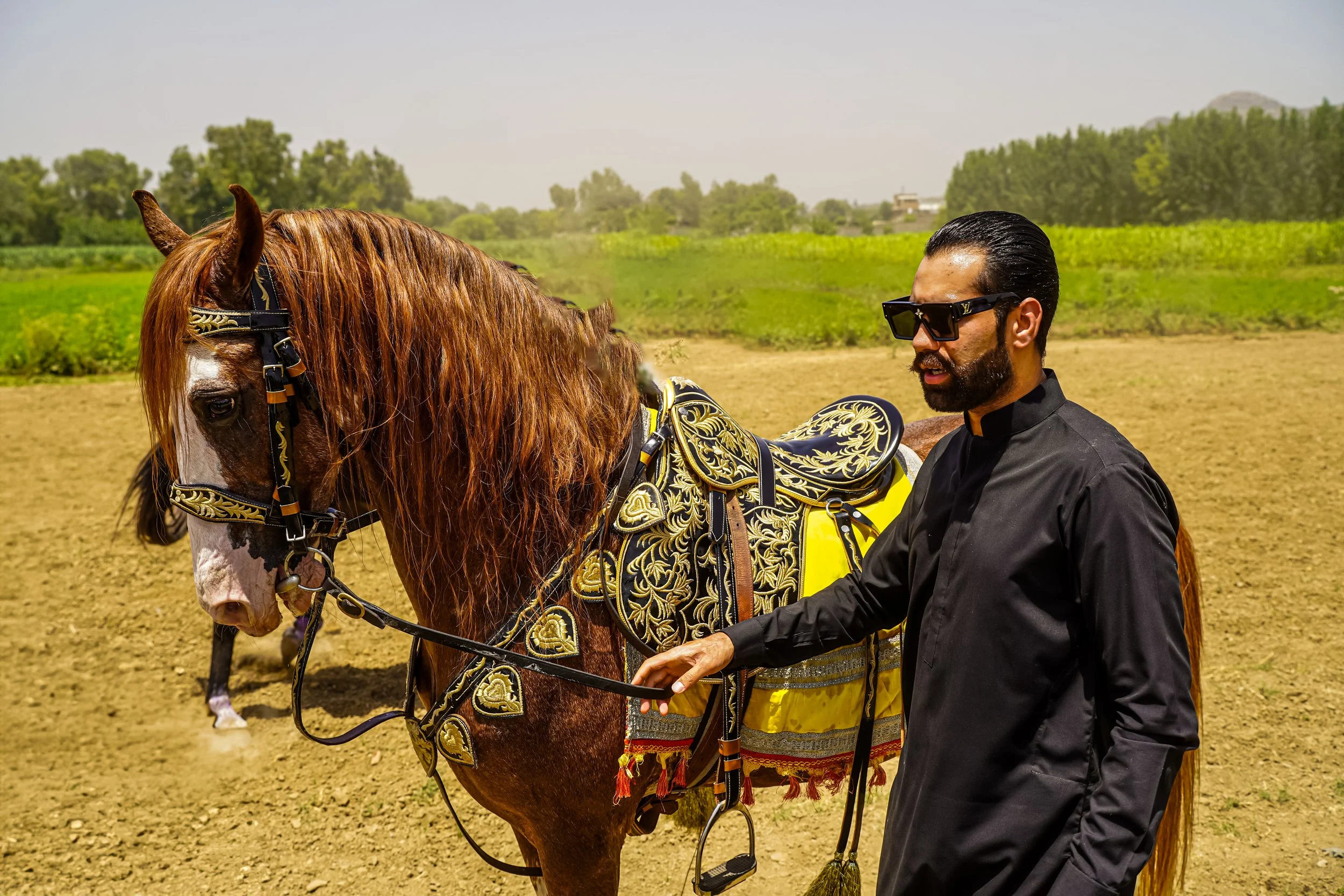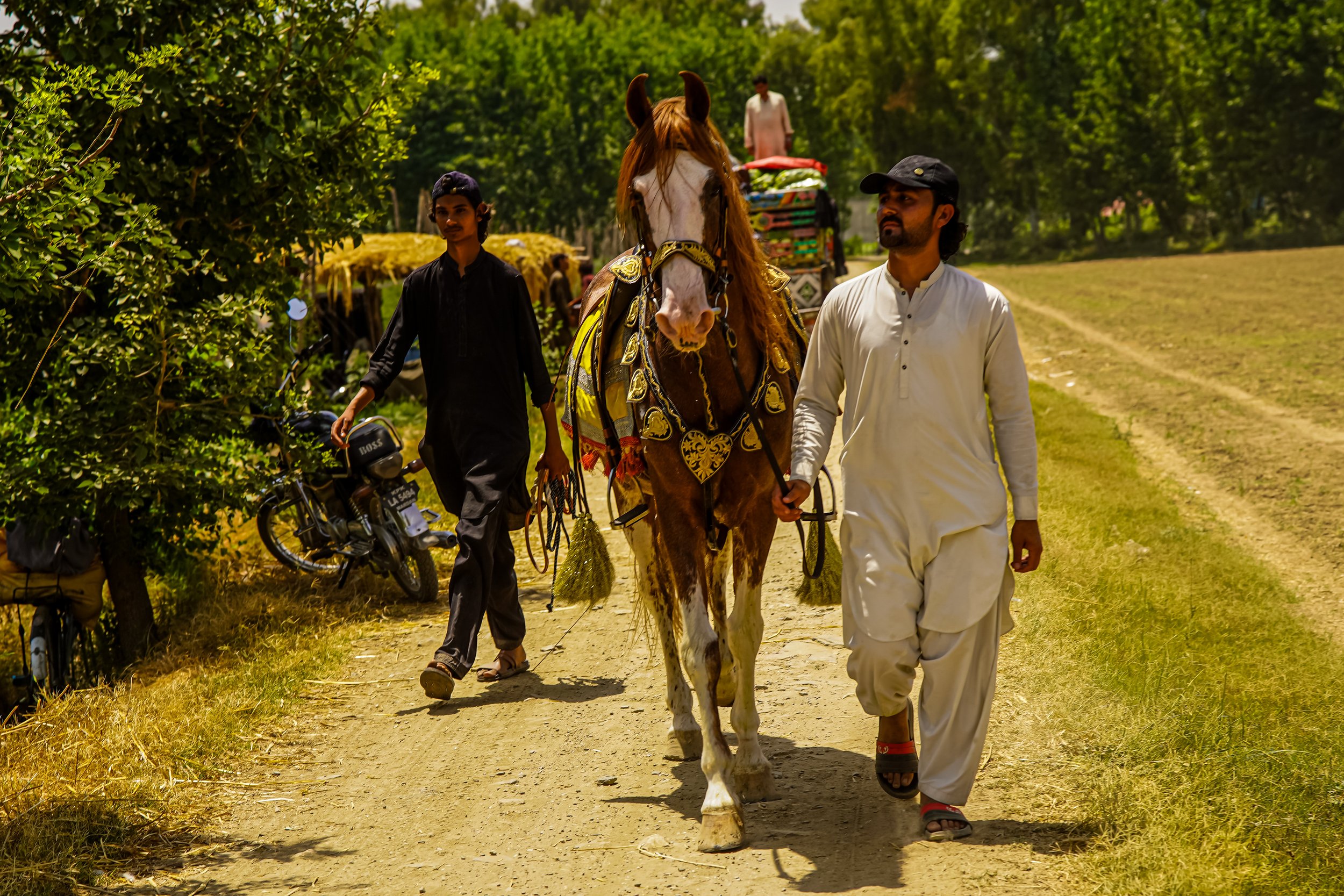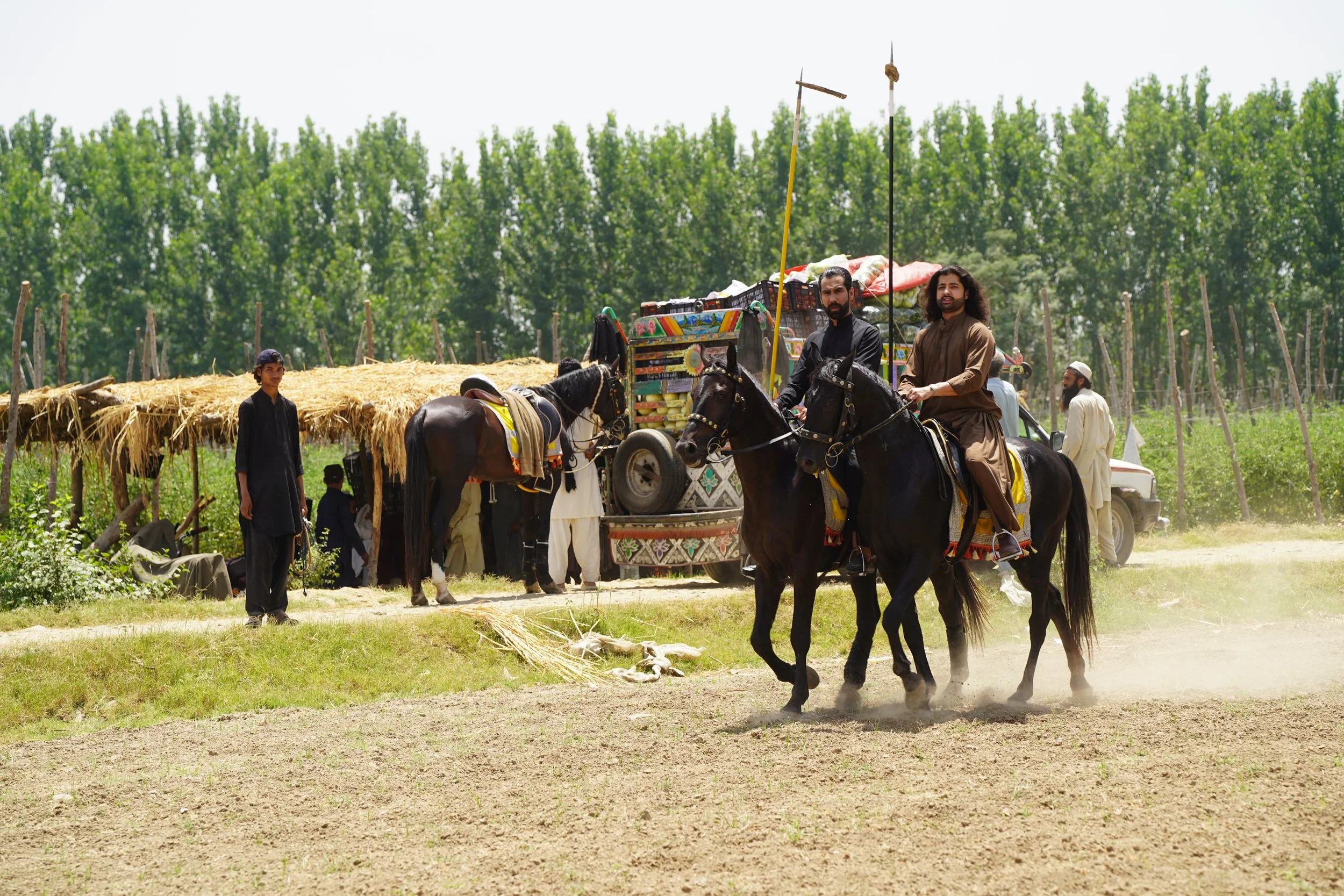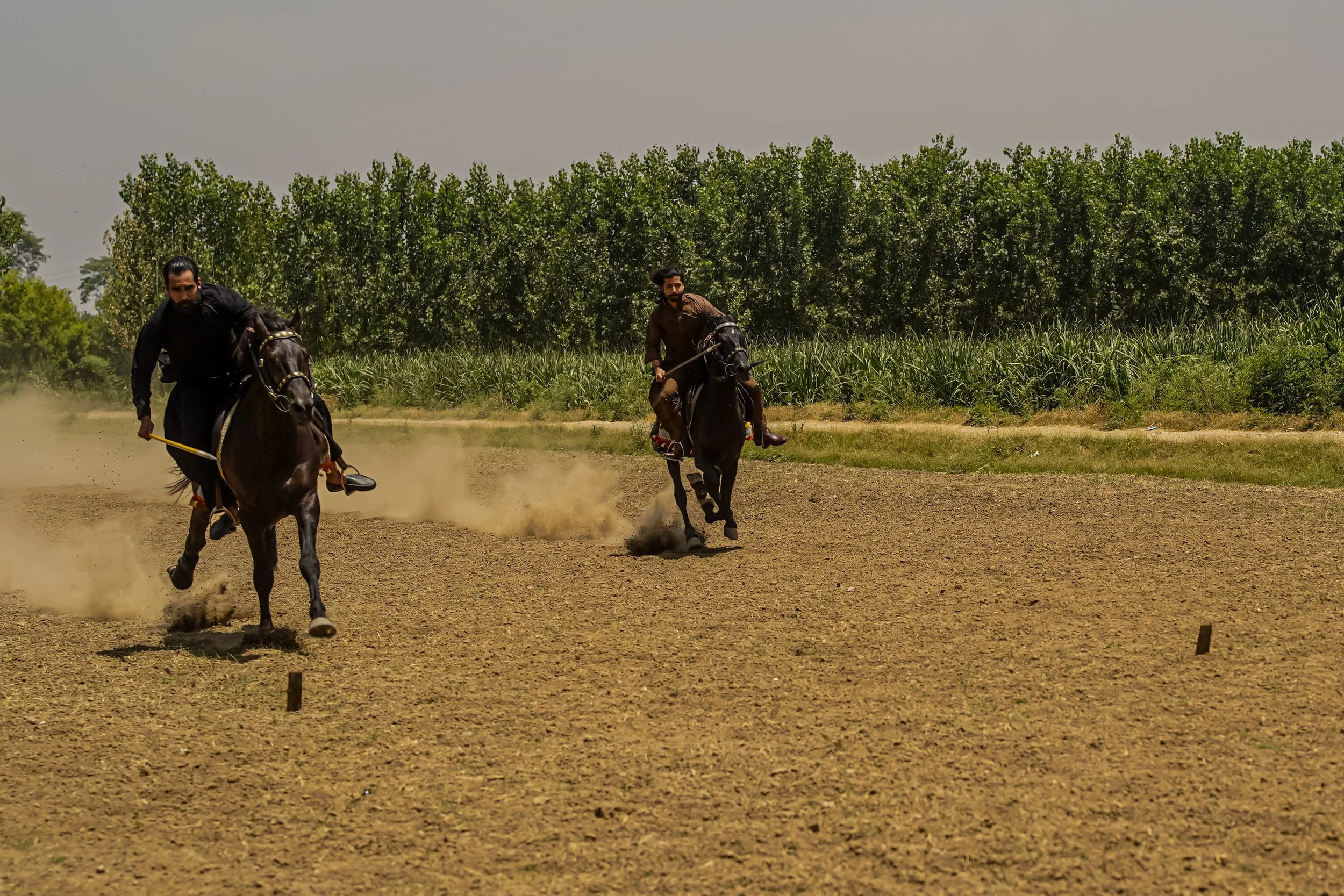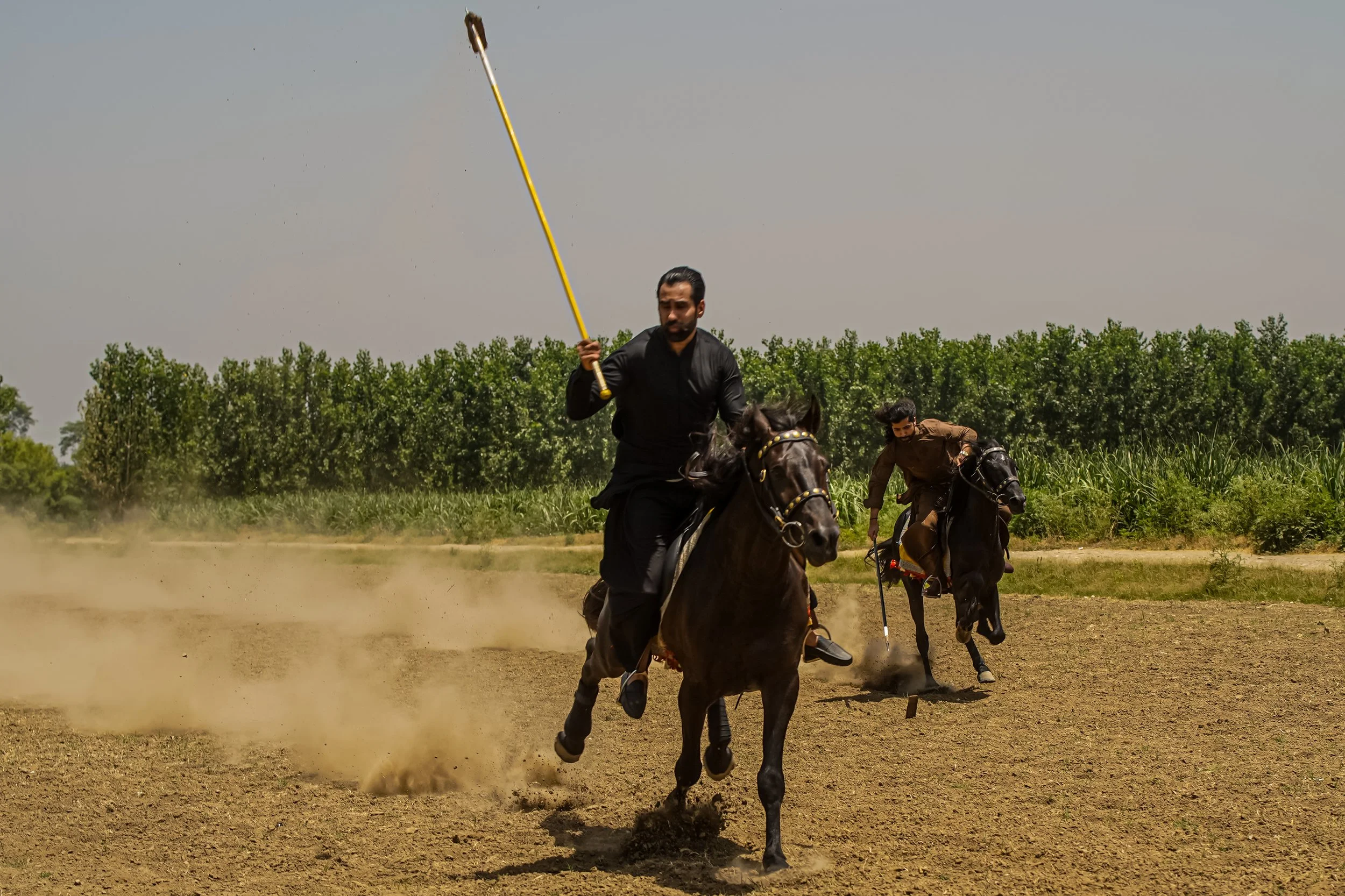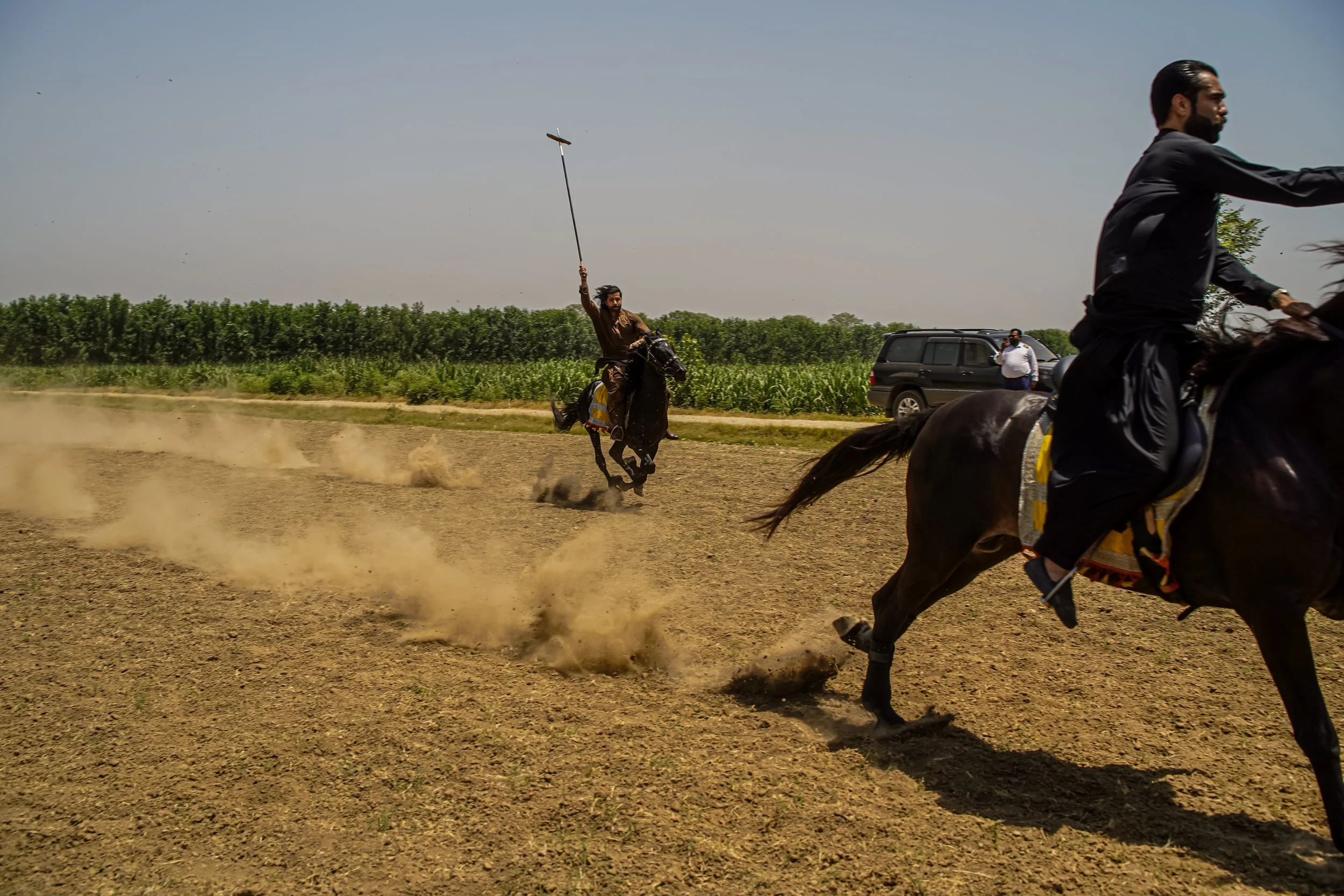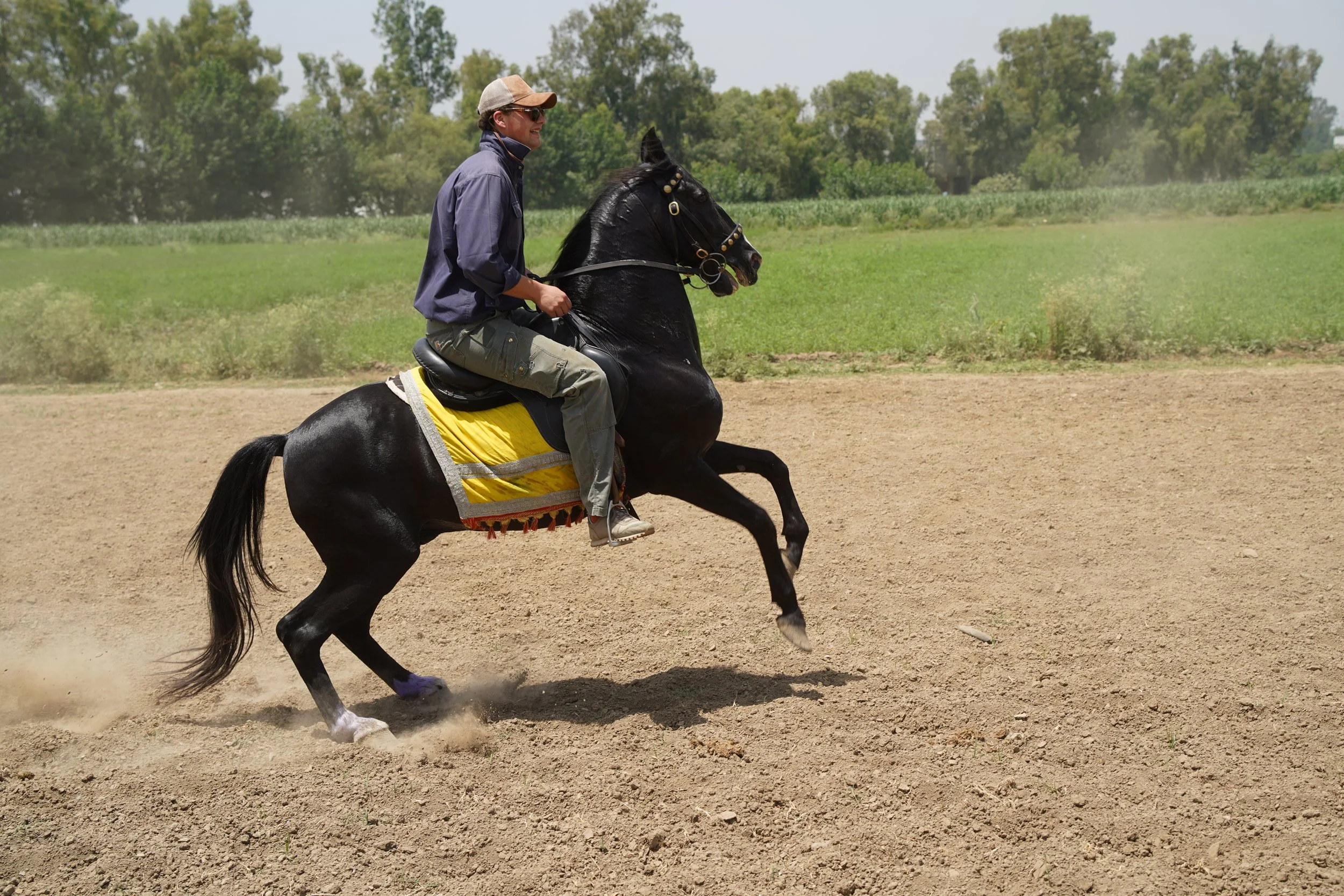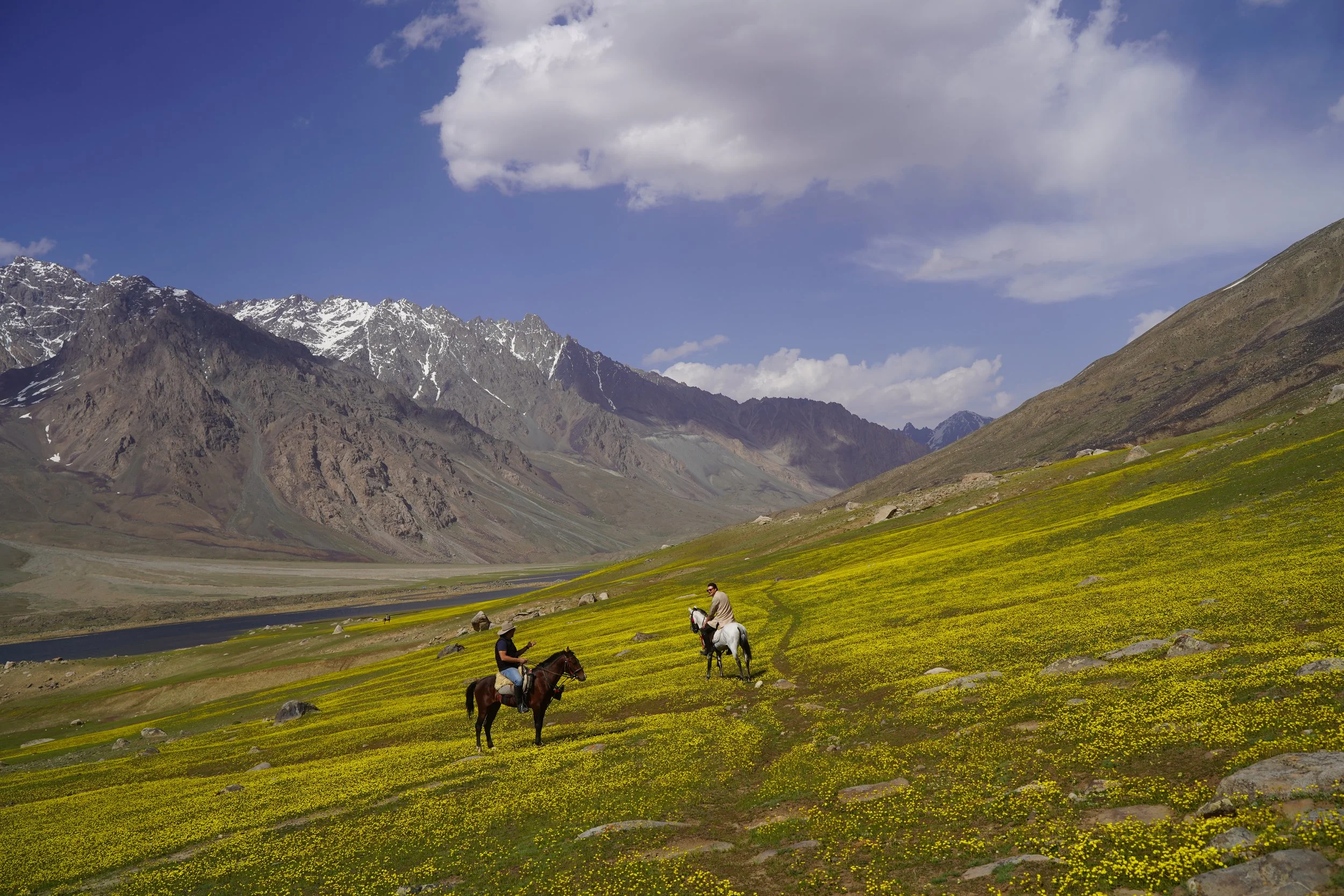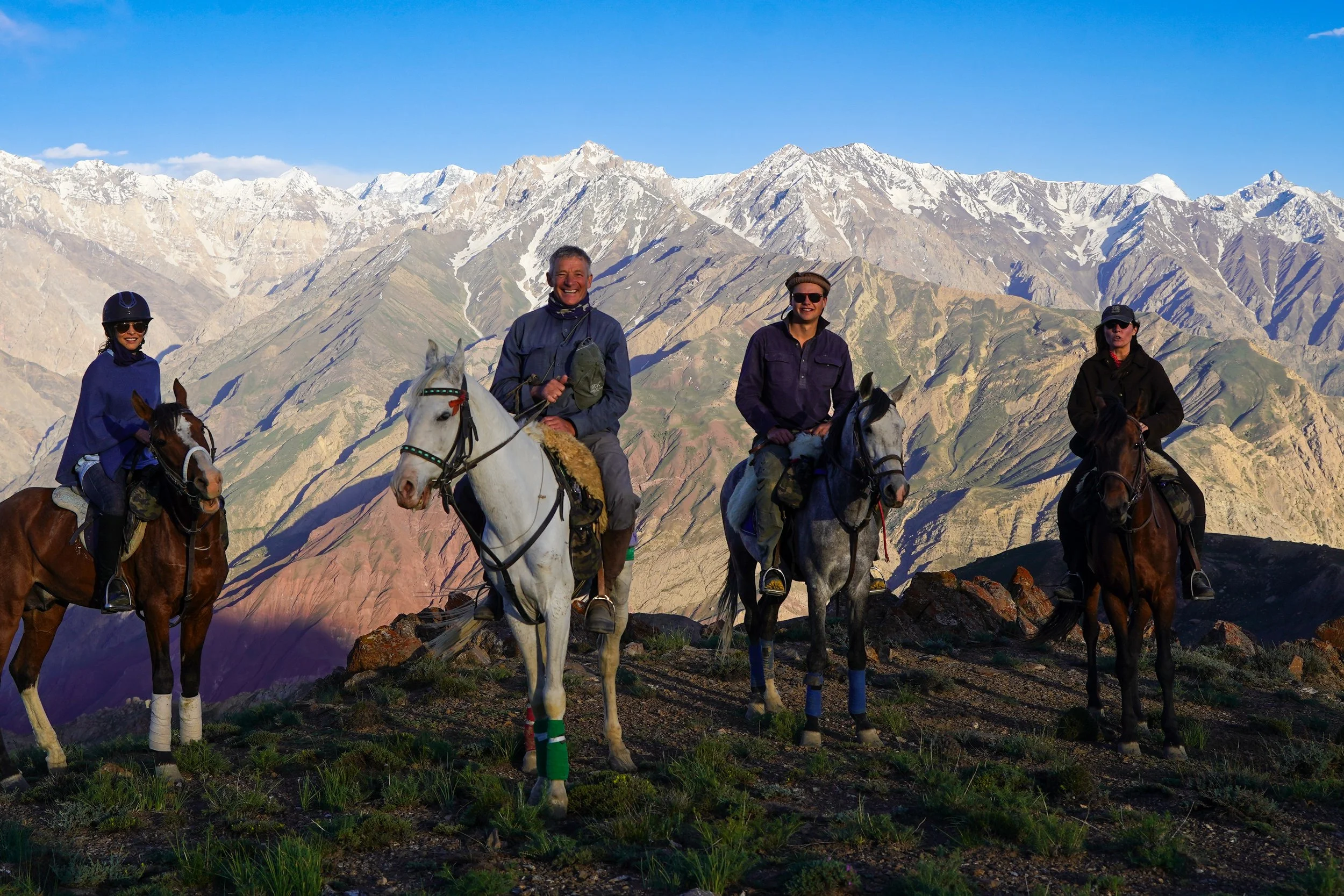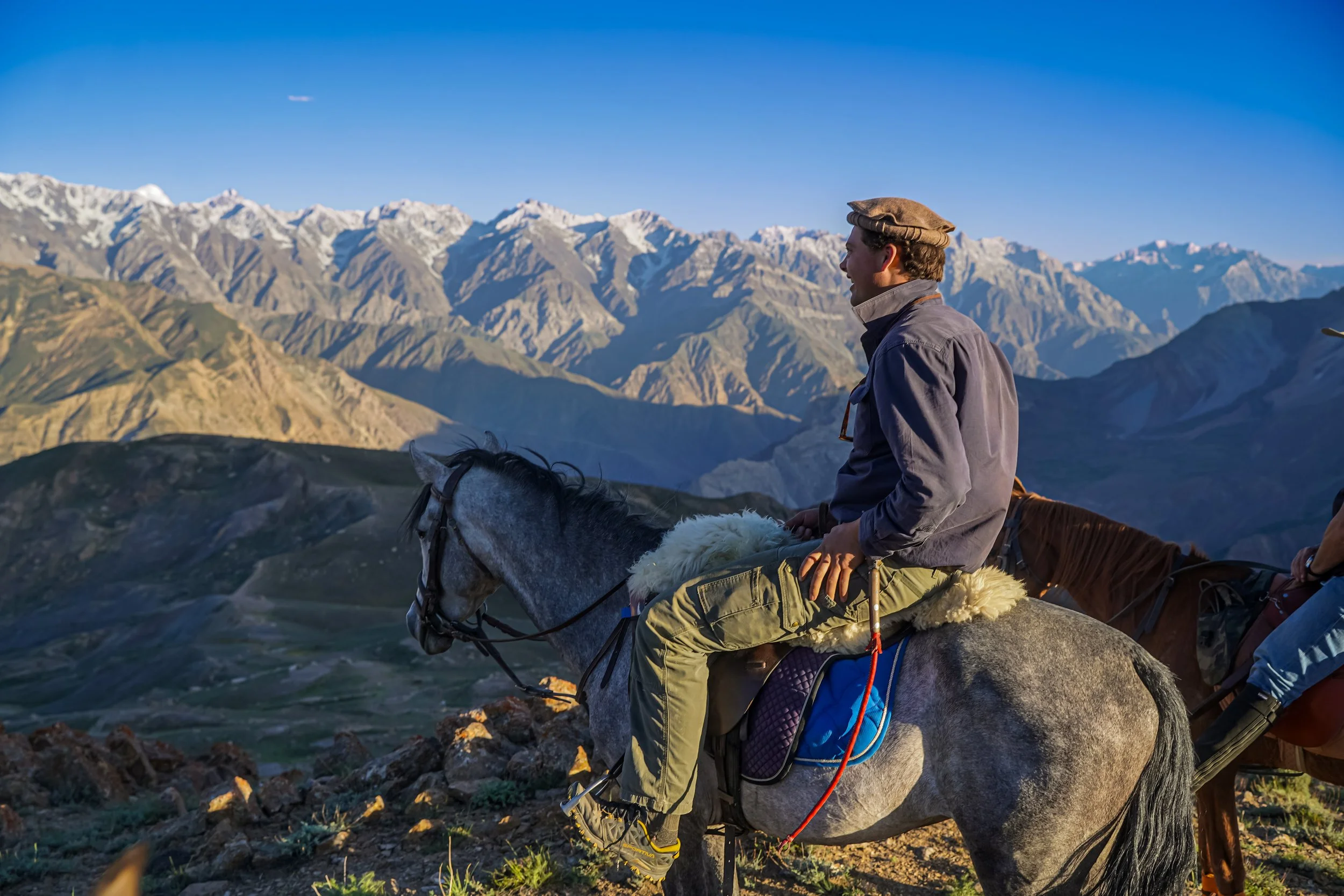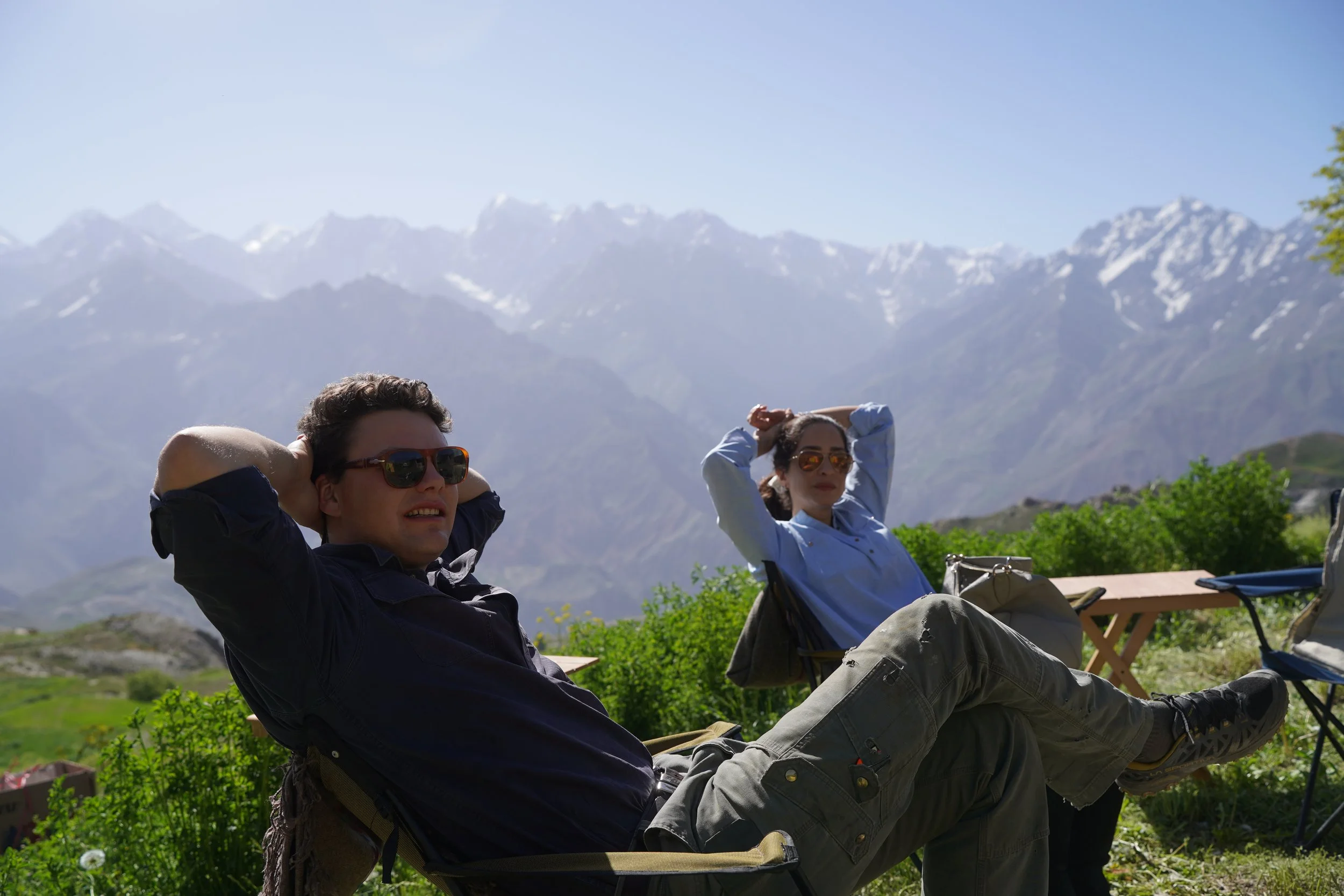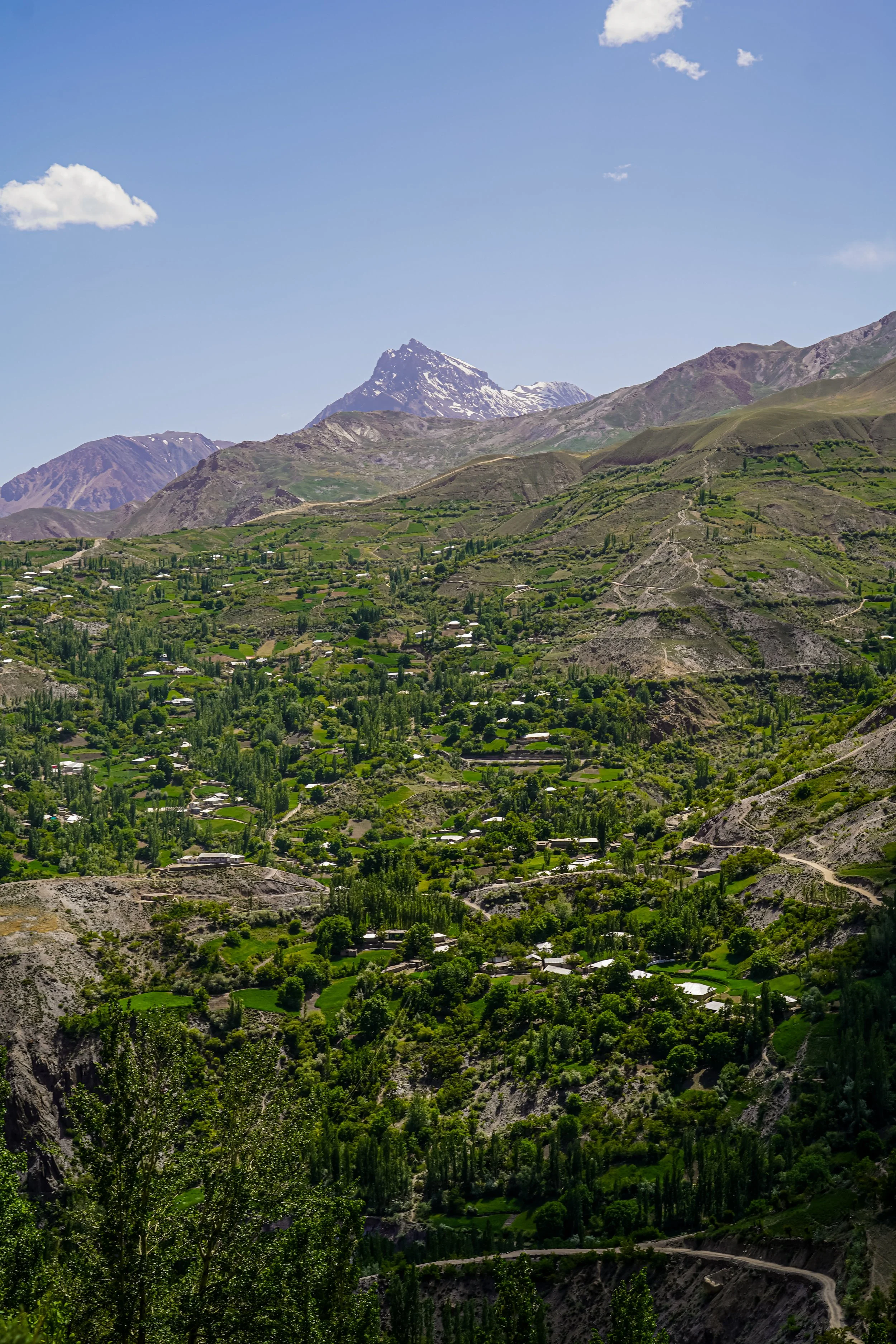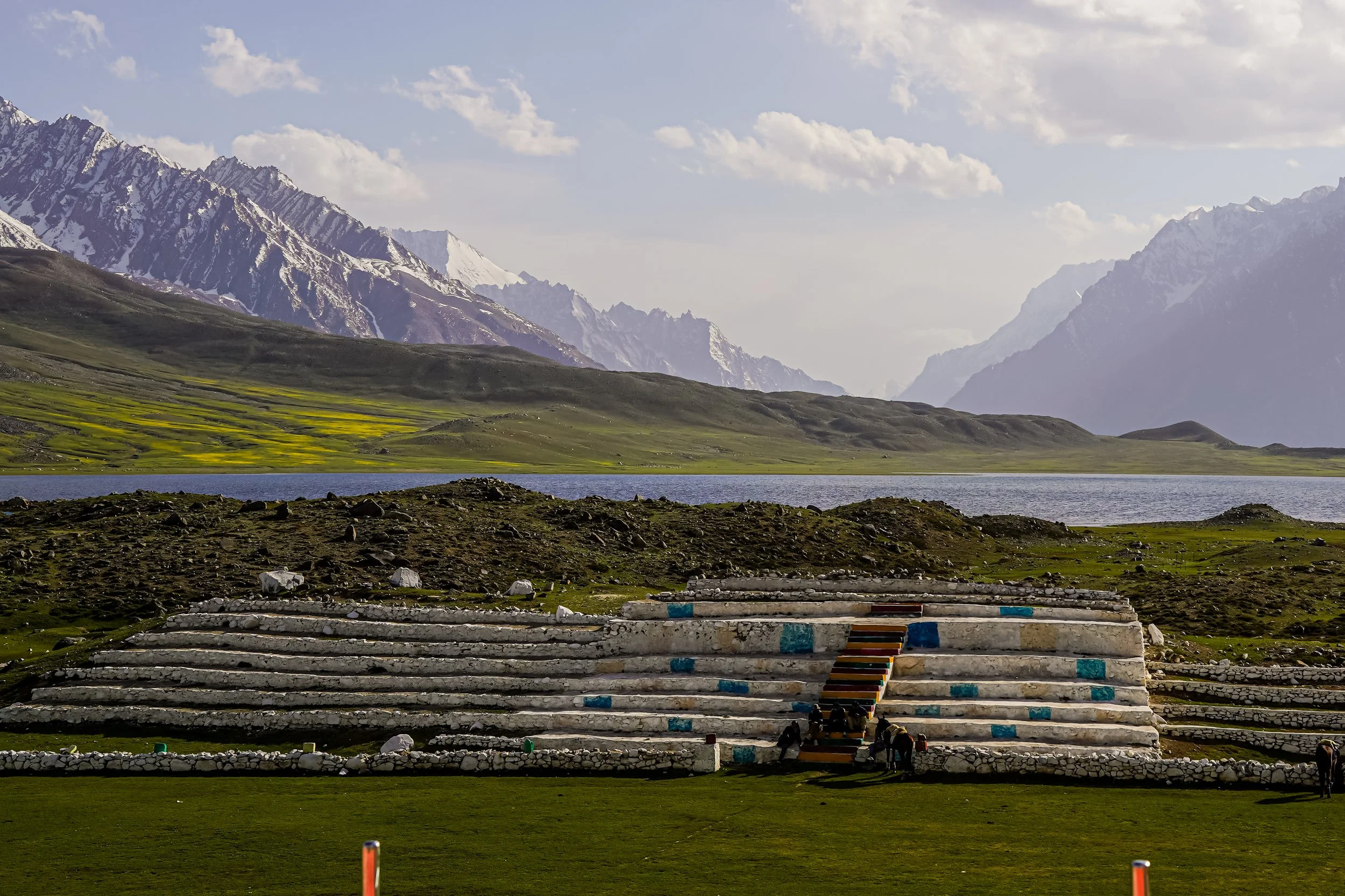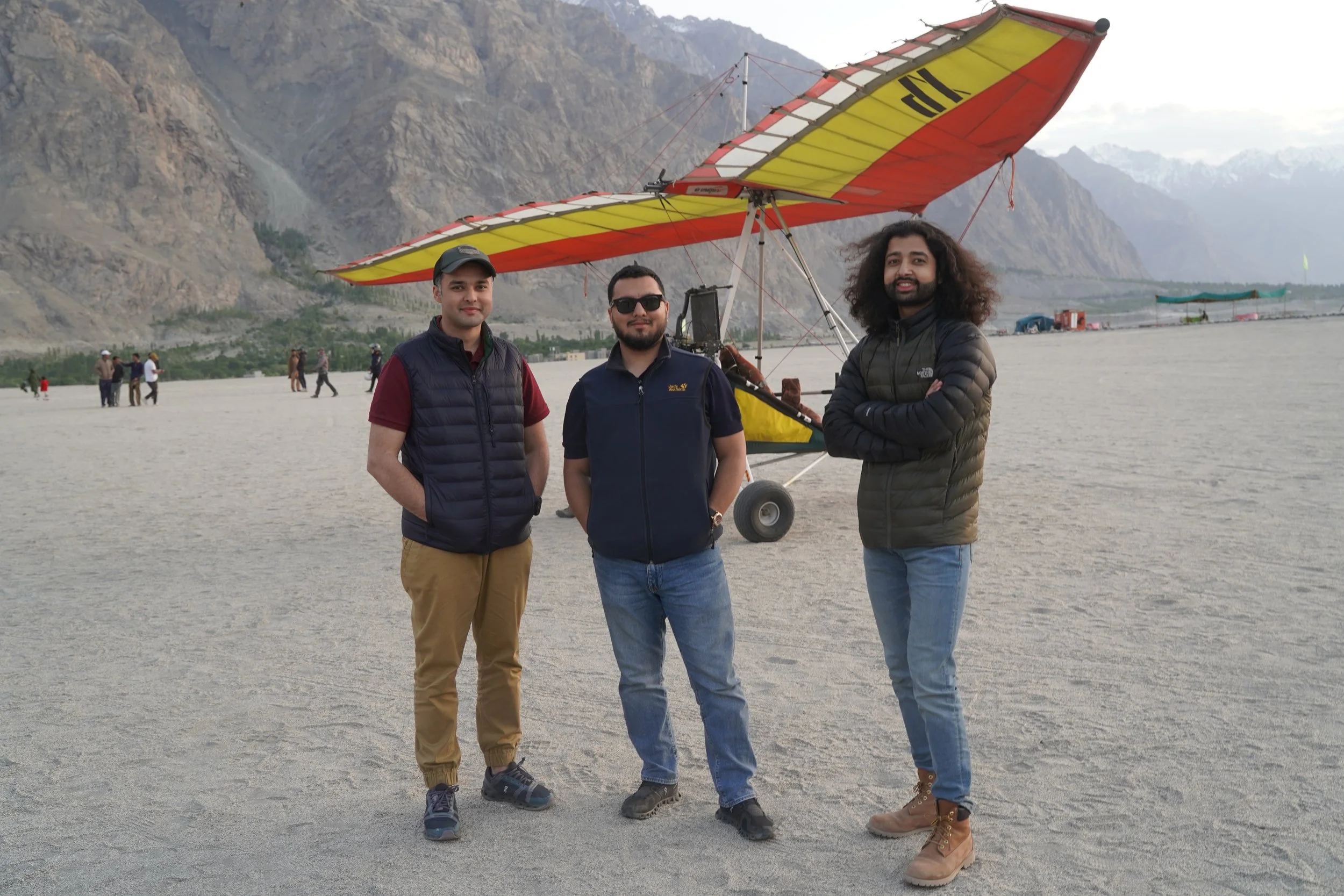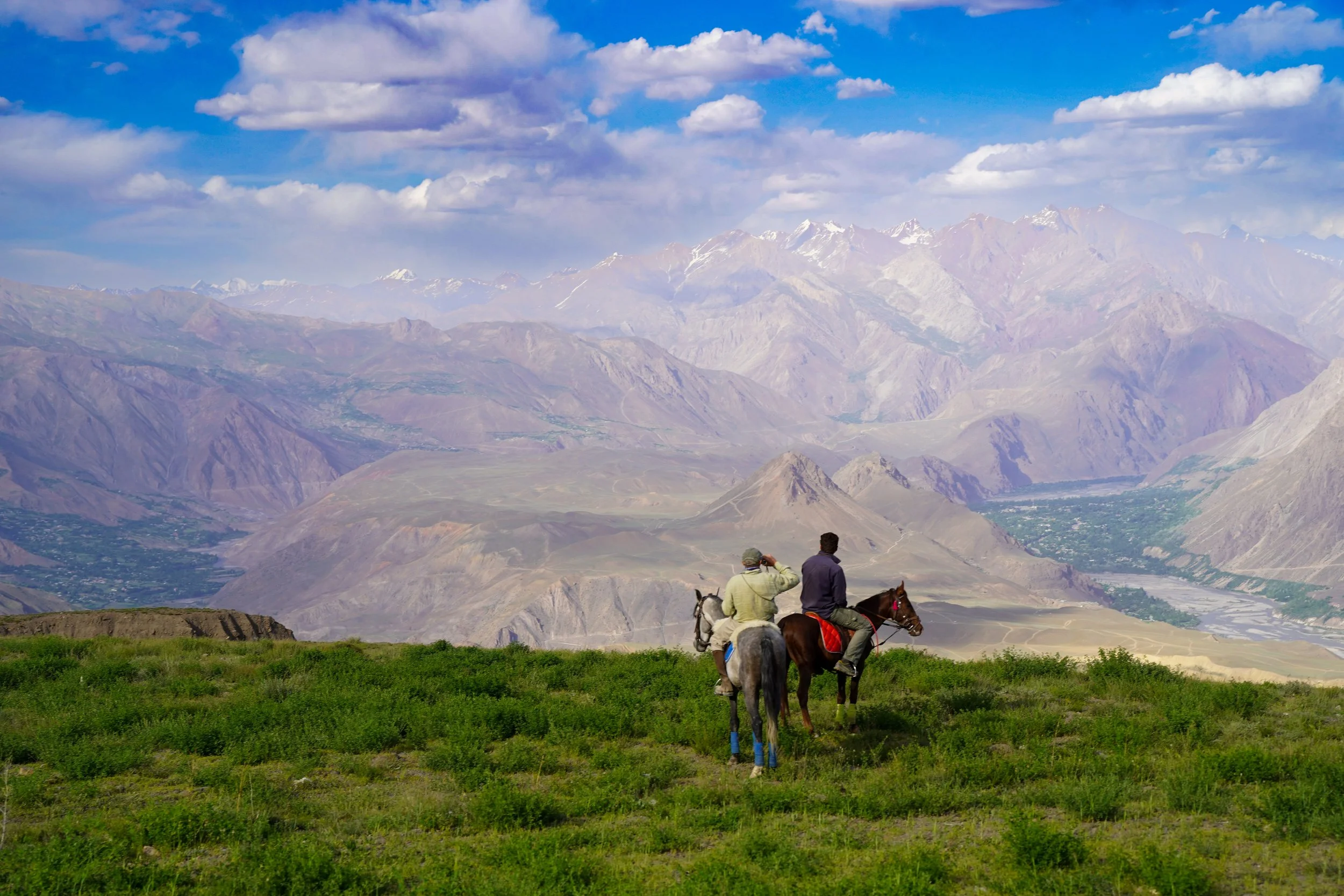
THE ROYAL HINDU KUSH RIDE
THE NEW RIDING SAFARI FRONTIER
Arriving to Pakistan just three days after the cease fire with India might not be everyone’s idea of a fantastic to start to a holiday but it makes for a great story.
May 2025
This was my third visit to Pakistan but my first to the Chitral and the towering Hindu Kush mountains, following in the footsteps of Rudyard Kipling, Winston Churchill, and Alexander the Great.
Our hosts, Zainab and Qublai, a Chitrali princess and former captain of the Pakistani Polo team, were awaiting us at their hill-top hotel overlooking the city Zainab’s family has ruled for hundreds of years.
Guests drive through a tunnel at the top of a pass close to the border with Afghanistan and spit out the other side into a world of jagged rocky mountains, fortresses, bushkazi (goat polo), a crashed plane-turned cafe in a remote valley, black magic, snow leopards, venom-spitting goats, border guards and the world’s highest polo ground at Shandur.
First though, we were off to Islamabad polo club where the army were still guarding rocket launchers set up in front of the president of Pakistan’s residence.
A WARM WELCOME IN A TENSE CLIMATE
The polo club in Islamabad is a central feature of social life in Islamabad. The grassy pitch is lined with club rooms and outdoor furniture for viewing of Pakistan’s national pastime - polo. The sport is taken seriously here.
We were a small group of just myself, a Welsh surgeon named Angus who had climbed Everest and joined almost every riding safari on the globe worth attending and Bertie Alexander, the host of the Nurpur Noon safari in Punjab
We ordered big glasses of fresh cold juice - alcohol is illegal in Pakistan. Behind us we could see rocket launchers and lorries filled with soldiers resting on the lawn in front of the President’s place. Pakistan and India had called a cease fire just three days earlier and opened the airspace. The UK’s foreign office hadn’t changed their travel advice to Pakistan during the short-lived friction. Kashmir, at the centre of the conflict was still off-limits but at the opposite corner of the country to where we were going. Everyone, including the two sons of generals, who were enjoying a juice in the golden hour light with us, was relaxed and in good spirits.
We were joined by Abbas, tall, dark and handsome with a perfecly curled moustache, immaculately dressed head to toe and wearing black and gold Louis Vuitton sunglasses.
Bertie tells us that when he first met Abbas introduced himself by saying “I am Abbas, the most notorious man in my family, and I come from a very notorious family.” He kindly invited us to his stud farm the next morning to see his tent-pegging horses. “It’s on the way to Chitral, I can show you my hand embroidered saddles and my leopard cub.”
We toured the polo stables filled with Argentine polo ponies and then drove to the private residence of the Ulmulk family for supper.
The Ulmuks have been the rulers of Chitral for hundreds of years. Even when Pakistan gained independence from the British they remained a separate principality before joining the country. Siraj, the head of the family and owner of the Hindu Kush Heights Hotel, had been a commercial pilot for most of his life and travelled the world extensively. Tomorrow we would start the nine hour drive northwards to Chitral to meet Siraj himself and his elder daughter, Zainabb. Tonight we were wined and dined us by his lovely wife, Gisaela.
FREESTYLE POLO
Polo holds a special place in Pakistan’s cultural and sporting heritage, particularly in the mountainous region of Chitral. The region is renowned for its unique version of freestyle polo, an untamed and exhilarating form of the game that is played without the modern rules and restrictions typically seen in international polo. Each year, the Shandur Polo Festival, held on the world’s highest polo ground at Shandur Pass (12,000 feet above sea level), brings together teams from Chitral and Gilgit in a fiercely competitive tournament.
Drawing thousands of spectators, including locals, tourists, and dignitaries, the event is a celebration of tradition, sportsmanship, and regional rivalry, set in the breathtaking backdrop of the Hindukush mountains.
THE KHYBER PAKHTUNKHWA HIGHWAY
That morning we left Islamabad in a convoy of armed black SUVs. Abbas had recently inherited a large estate and in this still-feudal country that can be a dangerously fortuitous position to be in. Four cars filled with armed security followed us nose-to-tail, lights flashing. Hoti Stud Farm is in Mardan, a city of 360,000 people in the Khyber Pakhtunkhwa Province. Abbas’s tent pegging horses are all stallions and bred for a smooth, stable canter that make it easy to wield a spear at speed in full regalia.
Tent-pegging is an ancient sport that’s undergone a major revival. Each competitor gallops towards a tent peg on the ground. There is one chance to accuratel stake the peg and swing it victorioulsy above your head to move onto the next round. Games can have 2000+ participants and glory is the ultimate prize. Once a useful practice for soldiers that would pull tent pegs out of the ground in an ambush, trapping the enemy, or, rather harshly, stab the feet of armed elephants during battle.
Today much of the fanfare is around the presentation of the horse and rider and Abbas showed us his gilded saddles and tassled bridles in his tack room that any horseperson would covet.
Temperatures were rising close to 50 degrees celsius in an unseasonal heatwave and we took refuge in the stable dining room where iced lattes appeared. While we sipped happily the front door popped ajar and a leopard cub, white with yellow spots, slinked into the room. Bertie’s friend Malik scooped her up, stroking her gently and she relaxed in his arms. Abbas shared how cubs are born white but she would darken as she grew to be black with yellow spots. Pakistan has one of the largest exotic animal markets in the world, trailing just behind China and Russia. You can find almost any animal you like.
Abbas and his armed guards escorted us to the highway and we continued our long drive to Chitral in the top corner of the country, nestled in the mountains between Afghanistan to the west and Tajikistan to the North. We stopped at military point of Churchill’s Post, a fortress near Swat where Britains most famous Prime Minister was stationed during The Great Game, The British empires war with Russia.
Shortly before reaching Chitral we stopped at a cousin of Zainab’s for a light lunch and a swim in her pool. Mira showed us photos on the wall of her home of her father dressed in full mujadeen regalia. He now lives in Las Vegas.
It was close to midnight by the time we reached the Hindu Kush Heights hotel. The hotel is perched on a hilltop overlooking a valle dominated by an airstrip - the same airstrip where Surjan has flown his PIA planes many times but now was out of use. The family warmly invited us to their personal home just next to the hotel for a welcome drink by their well-lit pool. The family was educated at international school in Islamabad and at boarding school in Britain but feel most of home here in the towering mountains of the Hindu Kush. Zainab and her husband have started construction of what will be their main residence just next to Surjan and Gisela’s home.
The views are magnificent and excitement grows for the ride ahead and to see the landscape in the light the next morning.
THE UL-MULK FAMILY -MEHTAR (KINGS) OF CHITRAL
The Ul-Mulk family of Chitral is a prominent lineage descended from the royal Katoor dynasty, which ruled the princely state of Chitral (now in northern Pakistan) for centuries. The family gained particular significance after the British era, when key members played vital roles in regional politics and administration. Known for their aristocratic heritage, the Ul-Mulk family has produced several influential figures who have contributed to governance, diplomacy, and cultural preservation in the region. Their legacy remains closely tied to Chitral’s historical identity and traditions.
A SHORT RIDE IN THE HINDU KUSH
Families in Chirtral will have one horse for polo. It’s their most prized possession. The horses are so precious that the owners join the ride as grooms. It’s a great adventure for them too. Also escorting us is a local policeman with a machine gun hanging over his shoulder. We were never sure if it was for our protection or surveillance. Probably both.
The first ride is a three day route culminating with a gallop on the plateau. We ride to 3,200 meters, dismounting in extremely rocky areas to scramble. The policeman, far from being intimidating, takes me horse to lead it up the trickest part. The altitude is no problem for him but my lungs are burning!
Our reward on the first evening is a flat plateau, that Bertie points out is also used as a polo pitch. Snow capped mountains surround us in every direction.
We discover our first camp. Stand up tents with real beds await us. Safari chairs are spread in a semi-circle to take in the view. Rugs and cushions are laid out for post-ride slothing and Zainab’s personal masseuse has travelled from Lahore to offer shoulder and foot rubs.
The hotel staff serve us supper in the mess tent, a three course affair. A farm building next door has had a western loo built in. Unexpected luxury in such a remote village.
The next day we descend through mountain villages. Glacier water steams down canals creating lush fields and leafy tree cover. Houses are communcal with a central living area and a hexagonal roof with sleeping areas surrounding the central fire. Each home has a stable for the horse next door.
We enjoy lunch at the home of one of the staff, resting for a long time afterwards under the shade of trees in the heat of the day.
The horse owners trail us in a jeep, handing out water and waving when they spot us.
The second camp had a glorious view of the mountains and we sat outside to take it in. The stars came out in full force and as we were taking them in Bertie shouted and pointed out a fast-moving line of lights. Angus explains that it’s a Starlink Satellite train and not Pakistani missiles headed to India, much to Bertie’s relief!
On the final morning we galloped across the Qaqlaasht plateau, a welcome change in pace after two days of mountain riding. With no riding in the afternoon there was no need to save the horses.
That afternoon we drove to Mastij Fort, another holiday residence owned by the UlMulk family and the gateway to Shandur, the world’s highest polo field.
The drive resembles the Karakorum Highway with regular police checks and the strong, glacier fed river pulsing through the valley below. The Aga Khan has a residence hidden in a village on the otherside of the river.
We arrive for a late supper in the restaurant and are shown to our cabins that look onto the families fort. The next day we would rest and explore the village.
SHANDUR POLO
The Ul-Mulk family of Chitral is a prominent lineage descended from the royal Katoor dynasty, which ruled the princely state of Chitral (now in northern Pakistan) for centuries. The family gained particular significance after the British era, when key members played vital roles in regional politics and administration. Known for their aristocratic heritage, the Ul-Mulk family has produced several influential figures who have contributed to governance, diplomacy, and cultural preservation in the region. Their legacy remains closely tied to Chitral’s historical identity and traditions.
POLO ON THE ROOF OF THE WORLD
The Hindu Kush safari is a pilgrimage to Shandur Polo ground. The second half of the trip delivers higher peaks, vast alpine valleys, yaks, snow leopard tracks, live music and a session with a local fairy lady - who channels spirits and answers your big questions.
Shandur is in the rugged heartland of the Hindu Kush. The peaks were steeper, craggier, and rockier than the first half. Our horses and their owners were waiting for us on their village polo field. Mine had a toothy smile exposed that made him look completely deranged but he would turn out to be one of the happiest, most forward horses I’ve ever ridden. These horses were fresher and we jogged out of the village up towards Shandur Pass. Away from the irrgiated village the landscape turned arid and bare and gave a feeling that Mujadeen could emerge from a cave at any moment.
“Welcome to 144 WIng Chitral Scouts’ - a message from the military written on the side of the hill in white stone greeted us as we crested the road and saw Shandur Valley spread before us.
Every July the valley welcomes thousands of visiters for the annual polo tournament that grips this part of the world. When we visited the sun was shining, the valley was filled with May wildflowers and yaks were grazing on the banks of the alpine lakes.
The joy of reaching this stunning location took hold and we galloped the horses across the plateau, scooping up yaks and dodging ditches until we reached the lake in the middle.
We splashed into the water and walked the horses through the lake, taking in the towering mountains around us. A couple of kicks got the horses to swim, much to the dismay of their owners when they caught up to us in the jeeps.
The polo ground was just in site of a rocky outcrop. We attempted to canter onto the pitch but the military was present making sure we didn’t do exactly that. The owners collected their horses and took pictures in front of the scoreboard and we were served a chicken burger for lunch. I made a mental note to return and experience the polo match for myself one day.
Our camp was close by on Sirjan’s property. Everything was already set up when we arrived and we were able to lounge on the rugs and cushions until supper was served.
The next day we rode out of Shandur Valley and crossed into neighbouring Gilgit for a short while. There were military posts to pass through and passports to show. The guards were dressed smartly in their sagwall gameed and woolen gilets. Some had sunglasses. All had a machine gun strung over their shoulder like an accessory.
We diverted off the road and back up into the mountains towards Chamarden Pass. On our climb that afternoon we came across the 4x4 support vehicle convoy in line behind a large deposit of permafrost. It was too thick to pass through and so the team were ferrying our camp and luggage over the snow to the campsite.
It was my birthday and the camp team had erected a sign wishing me Happy Birthday, bright green and covered in horses, and were dancing as we approached. It started raining heavily just as we arrived and the mess tent was quickly erected for shelter. A bottle of tequila appeared and shots were had - for the warming effect of course.
Late that night, around 10pm, we heard the sounds of approaching motorbikes outside. A group of eight young men from the village had arrived to sing for us. They were completely soaked but perservered, playing different sized drums, one was beating an empty jerry can, and sung loudly in chorus. A fantastic birthday treat!
The next morning we awoke to find it had snowed and a herd of yaks were grazing around camp. We started our ride over the pass. The snow at the top had covered the road so we went off-piste, searching for the easiest route for the horses. The local horse guide repeated often that is was impossible and we should turn back. Bertie believed we could get through. We dismounted and led our horses through deep pockets of snow. The horses bunny-hopped through the snow with powder up to their chests. We were lighter and could somewhat inelegantly walk our way across the surface.
As we started our descent the snow disappeared and rainbow coloured mountains of red, yellow and green unfolded before us. The decent was rocky and steep. In some sections we dismounted - the horses were much more surefooted than we were. The arid rocks soon turned into forests, then into villages and real roads. As the sun began to set I recognised the mountains around Mastuj and the fort soon appeared into view. The final ride was completed!
We had one more night at Hindukush Heights before we drove back to Islamabad. Though it was Zainab’s birthday we had one more important stop to make. She accompanied me to the house of a fairy lady. I watched as she closed her eyes and opened them, now channelling a local spirit. I was allowed to ask two questions of her, which Zainab kindly translated in Chitrali. She gave me two very clear answers. Whether they come true remains to be seen but it all felt very real to me.
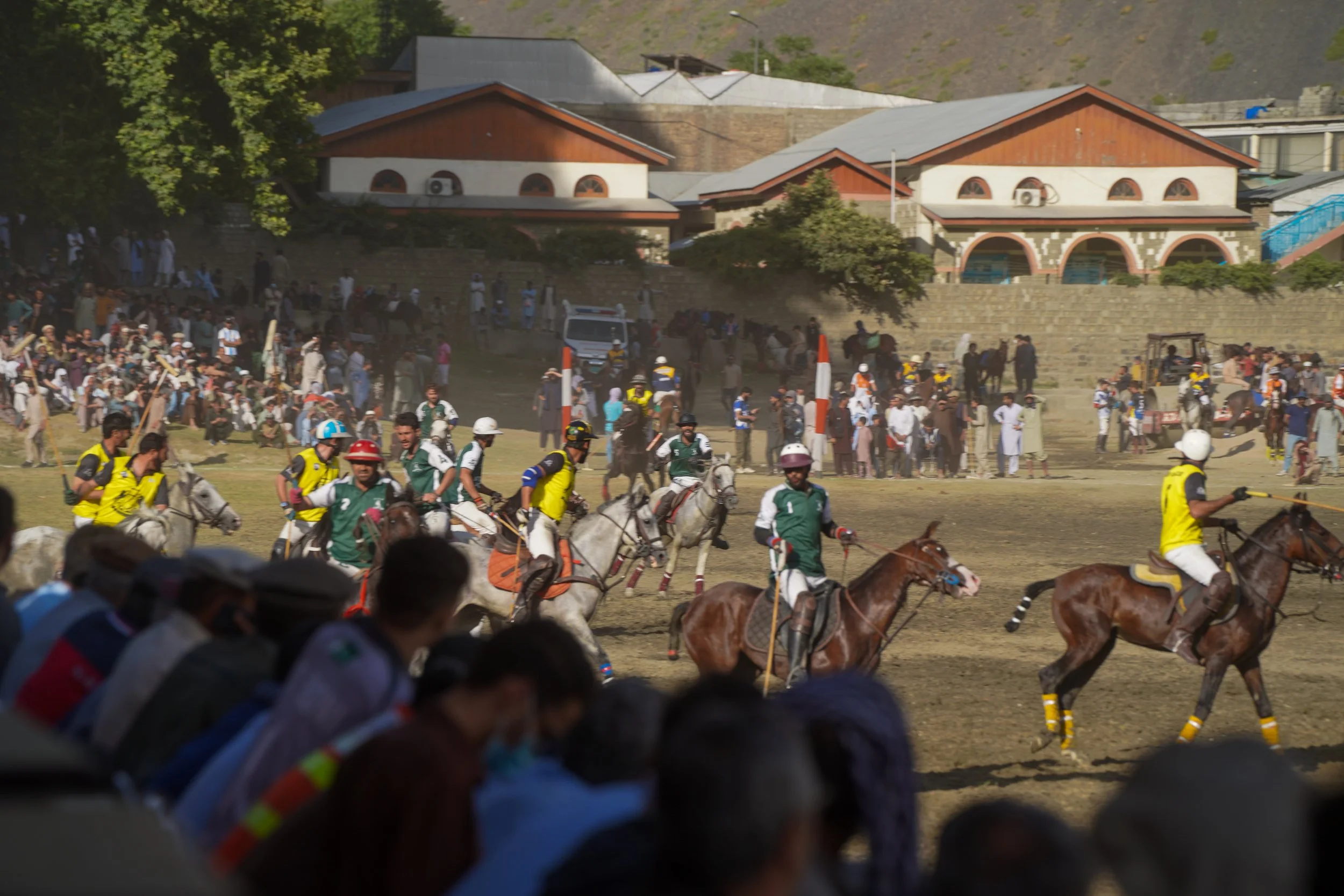
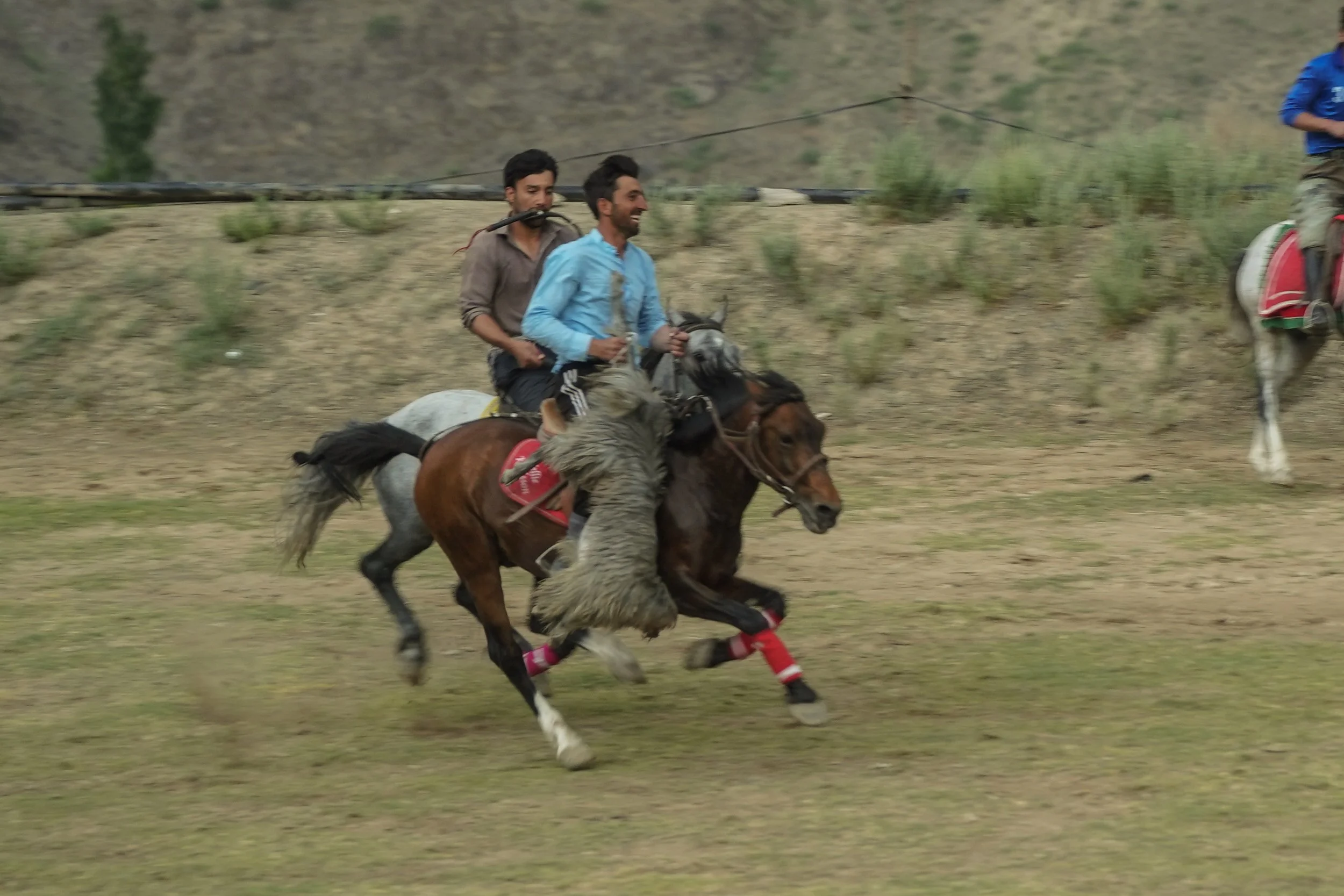
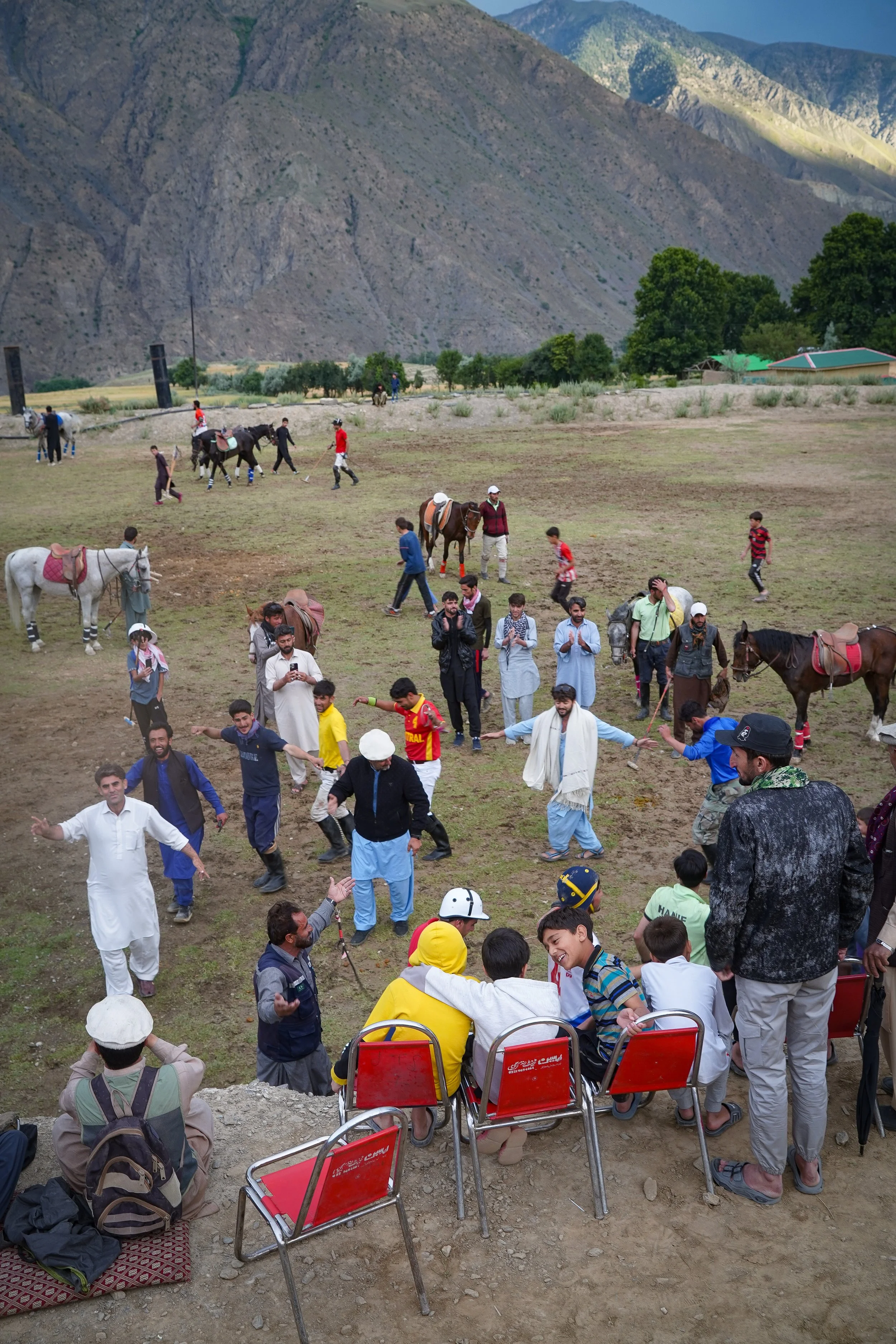
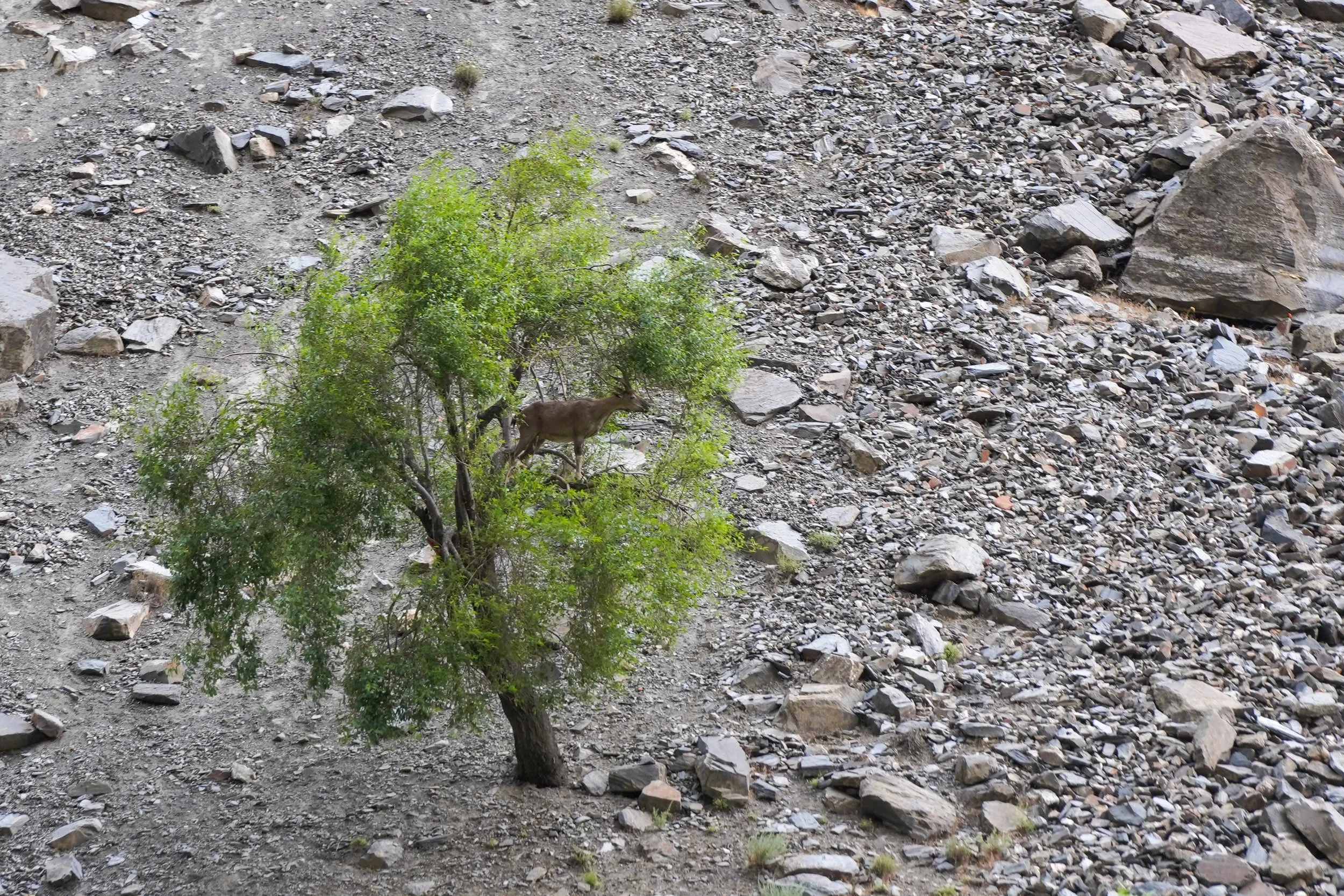
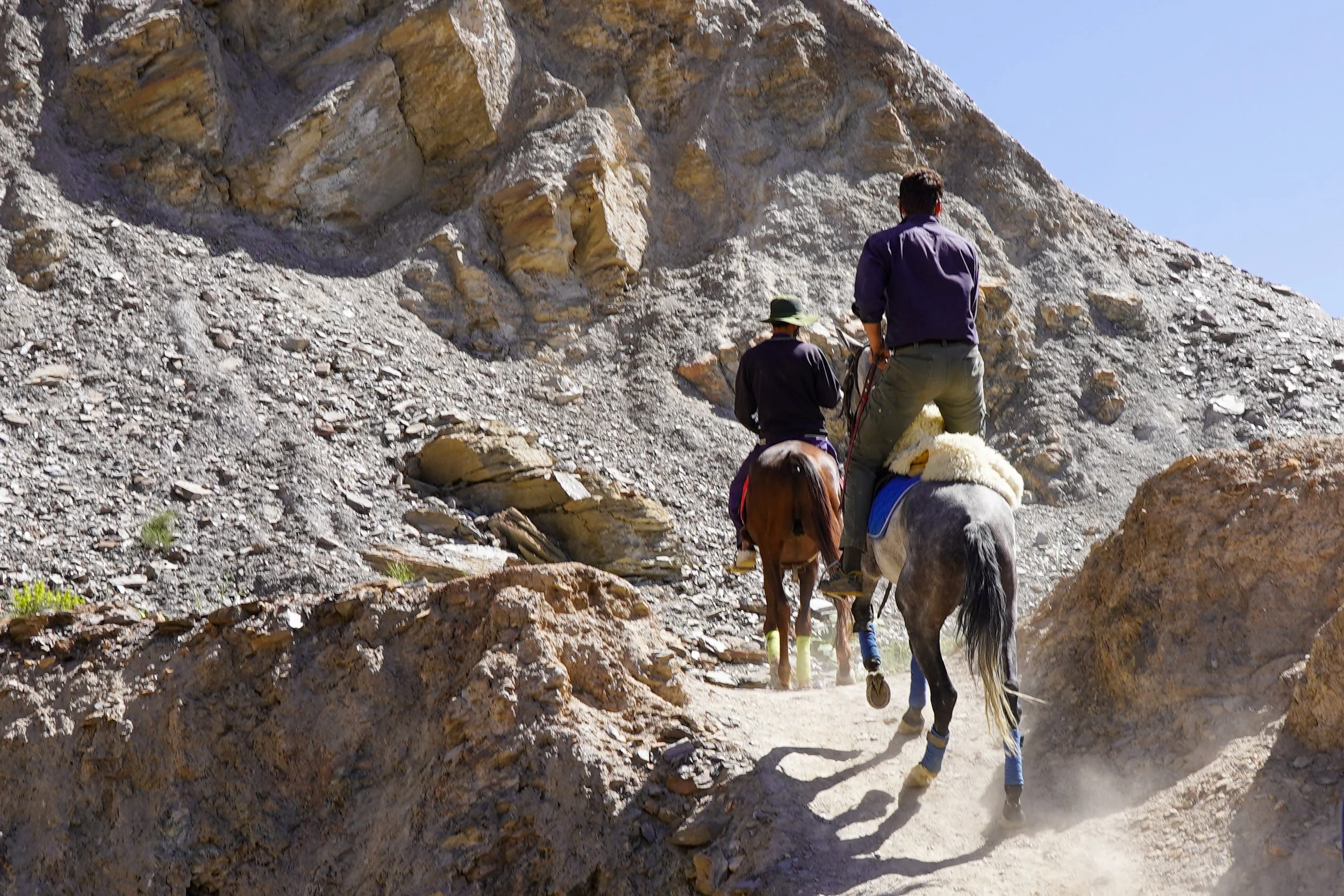
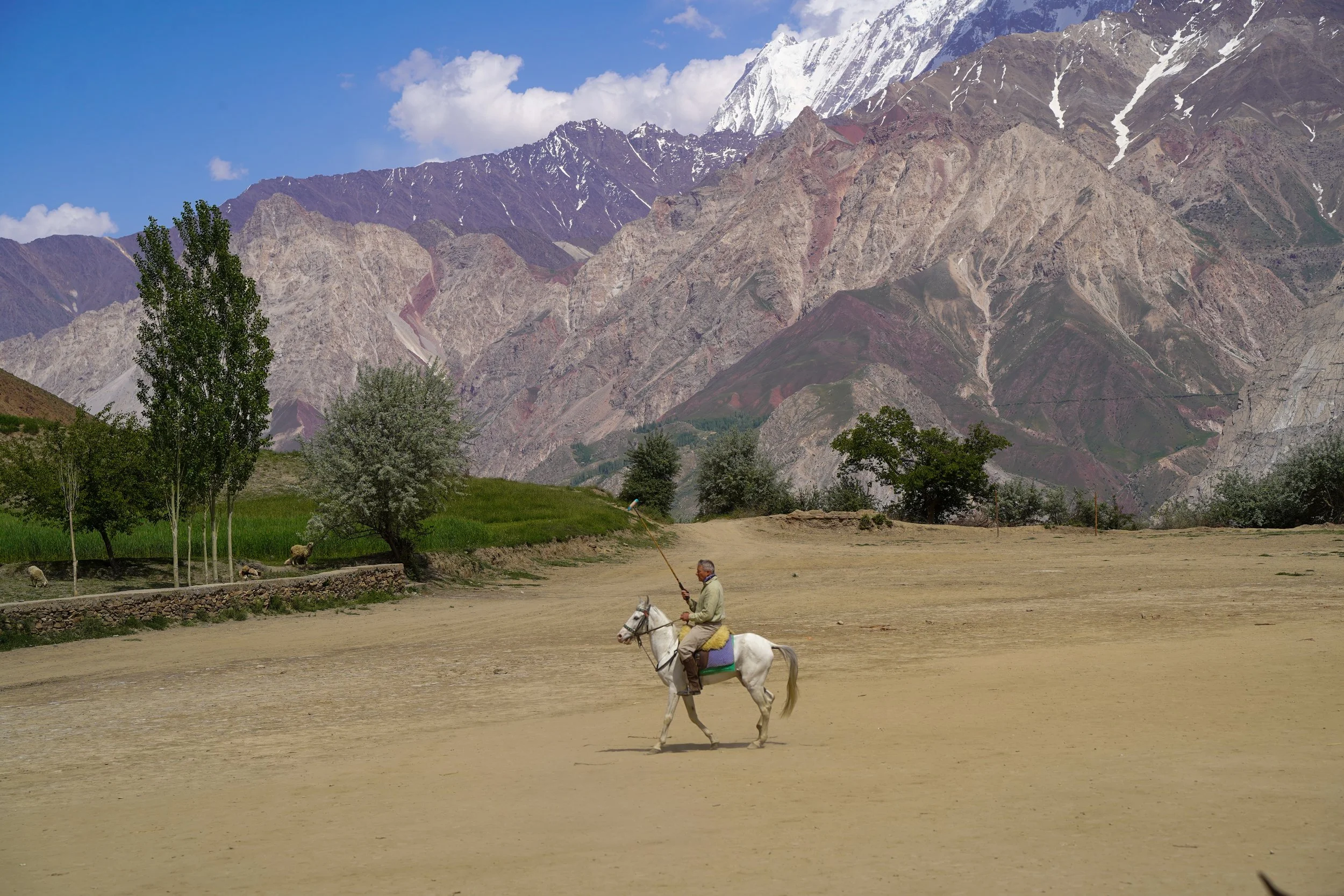
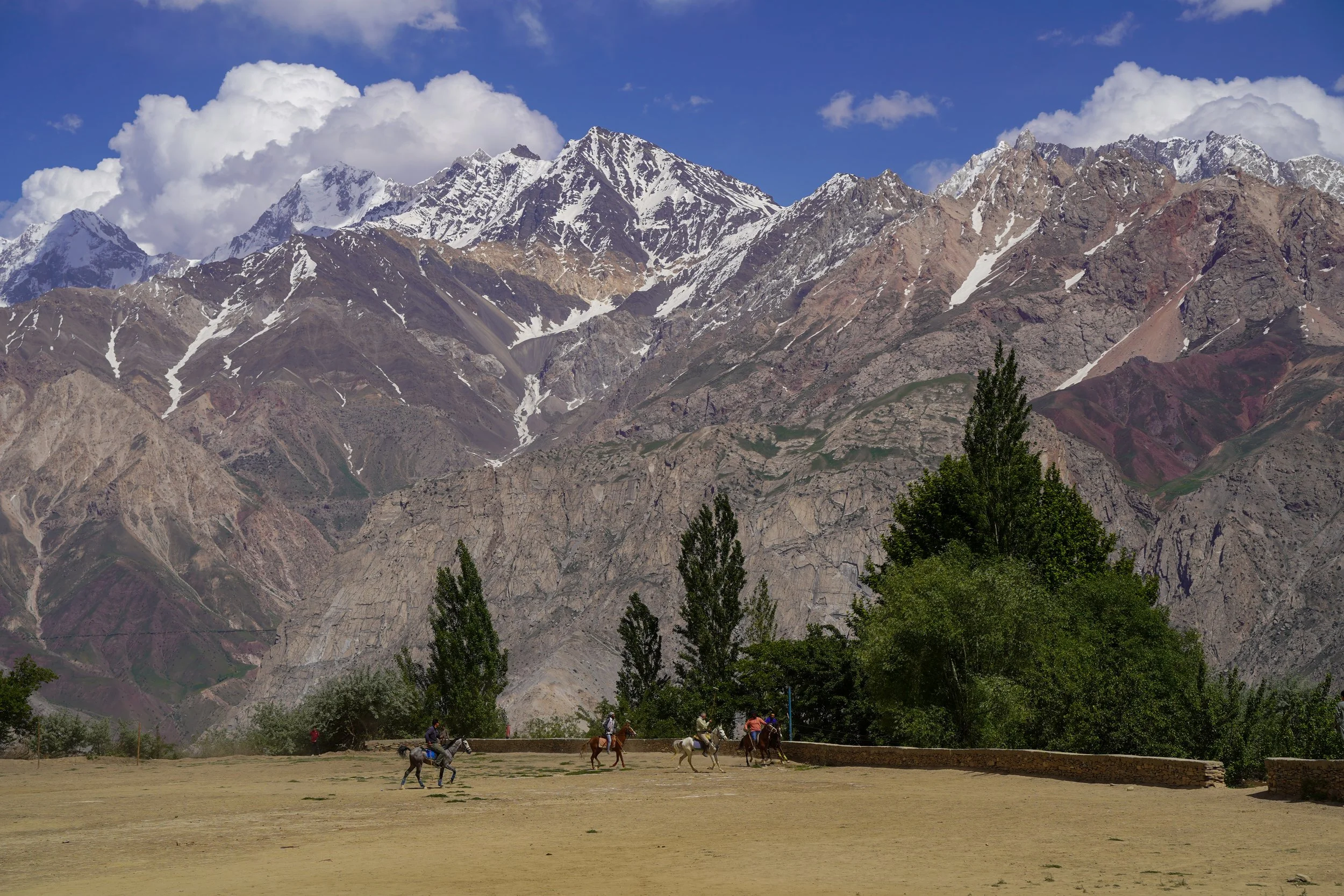
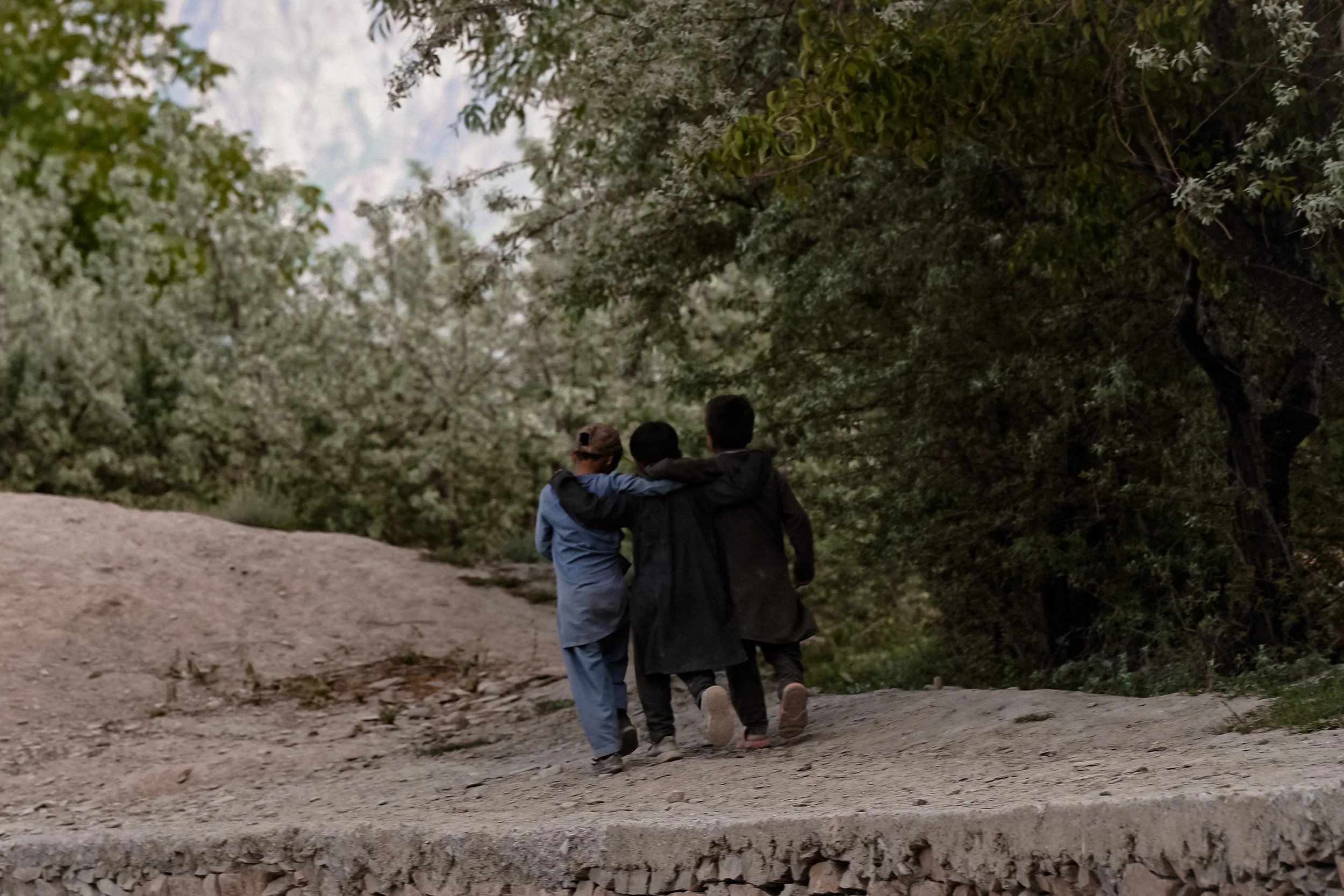
HINDUKUSH HEIGHTS HOTEL
Hindukush Heights is a family-run hotel that focuses on the uplift of the local community and its surroundings by taking active measures toward social responsibility and environmental sustainability.
Built by a local workforce over a 5 year period, primarily using materials sourced in Chitral; those same local workers were then given the opportunity to be retrained as service staff at the hotel.
The hotel staff join you at your mobile camps as you ride across the Hindu Kush.
THE GEM TRAIL - AN ANCILIARY MISSION TO THE FOOT HILLS OF K2
Chitral is a mountain principality frozen in time and Skardu is a modern mountain resort town with every good and shiny distraction for the worlds’ most intrepid explorers. Five star resorts, the world’s second tallest mountain, paramotors, rafting, a sand dune desert placed inexplicably at the foot of the Karakoram highway and best of all - mountains filled with gems.
When Bertie invited me to join him on a reccy trip to the gem mines with some horse riding thrown in along the way the magpie in me couldn’t refuse.
Skardu is completely different to Chitral. It feel slightly more modern. The people look different, more east asian. The local language is similar to Tibetan and completely intelligible to an urdu speaker. The flight to Skardu is one of the world’s most infamous and techincal - and beautiful - as it requires a clear sky as the plane makes a u-turn low over the mountains to land.
We were joined by Shamsher, Mesum and Ibraim, three friends from Islamabad with international connections. Three of the best-natured people I’ve ever met.
Mohammed, a local, has connections to mines three hours of of Skardu on the main road to K2. He took us to the home of one of his associates and we were offered tea as we lazed on cushions in the sitting room.
His associate brought a large plastic tub into the room and begins to lay out aquamarine in ever increasing sizes. Dozens of chunks of precious rock are laid out in front of us, with my eyes growing bigger and bigger with every reveal.
“All of these were taken from the mine we are going to go and see” Mohammed explains.
At our next stop it was a similar routine, tea followed by stones, this time they were all cut. Some were absolutely enourmous. Mohammed’s driver brings in a locked suitcase full of cash and bought the entire lot.
We zipped out of town in our SUV convoy, closely followed by the guards who had the suitcase filled with cash and gems.
We arrived to a desert plateau, surrounded by sand dunes, lines of 4x4s and paramotor planes. I was quickly loaded into a paramotor and before I could think about it too much we were in the air high above the desert. It was one of the most exhilerating moments of my life. The sunset framed the mountains and glaciers all around us in red and gold light. I’ve never felt anything like it and mourned the experience as soon as we landed. I made myself a vow that I would return to Pakistan to try the experience again as soon as possible.
That night we drove up a steep zig zag road to a 5* mountain resort. After 12 days riding I was wowed to see such luxury and took full advantage of the waterfall shower with views out over the mountain. These boys really know how to put on a holiday.
The next morning we met the horses on the desert. We were riding to the next town of Shigar. We rode across the desert, galloping up the dunes.
We stopped beside a lake and took the horses swimming the warm water. The rugs and cushions that I’d become so accustomed too were laid out and we ate fresh fruit and lazed in the sun. Fresh french fries covered in flakey salt appeared and I devoured them before enjoying a nap in the sunshine.
We continued our ride along the main road to K2. Colourful Toyotas loaded with alpine gear and climbers passed us regularly. We took the horses over the dunes and called over the SUVs, lining up in a row and racing, horses versus cars, across the sand.
The ride ended at a polo field and we tied the horses to farming equipment and went into a specialty coffee shop for an iced latte.
That night I stayed in the Shigar Fort. A beautiful, large, historical fortress with a warren of corridors to wooden rooms with views over stunning rode gardens. The fort was owned by the local Khan who had had the property in their family for generations. Our horses stayed at his stable next to the hotel.
That night we dined at a private home of a reknown home cook. As a women I was able to visit the kitchen, which was surprisingly modern and watched as she made us a feast, served to us in cast iron pots in the shape of ibex and Markor goats.
We traded horses for the cars the next morning and drove out to the mines. There were various check points along the way. It’s a sensitive area.
Mesum had travelled ahead to smooth our entry. The locals are not used to foreigners coming into rock face of their enterprise - literally.
We crossed a rickety bridge over a roaring river and paused on the other side. We waited for the all clear to move forward. We had to check that no one was dynamiting at that moment. From the ground I could see miners climbing ropes to the caves that ran along the veins of the mountains. Blue plastic bins filled with food and supplies were hoisted up to the caves. Men were sitting along the openings of the mines peering down at us and we peered back.
At the entrance to the cave with the easiest acess we were given hard hats, head torches and high vis vests. A small pile of rough cut stones lay in a pile just inside. An aircondenser and jack hammer run into mine. Red sticks of exploded dynamite lay on the ground.
One hundred meters in the earth the tunnel ended and we could see lines of black tourmaline running through the white stone.
After the mine visit we were served a delicious chicken curry in a newly built house nearby. I bought an aquamarine from Mesum from the giant cache he bought on the first day. Cut in Peshawar and notoriously difficult to get out of the country mine will be set as a ring back home in London at Hatton Gardens as a momento of my trip to one of my favourite countries in the world.

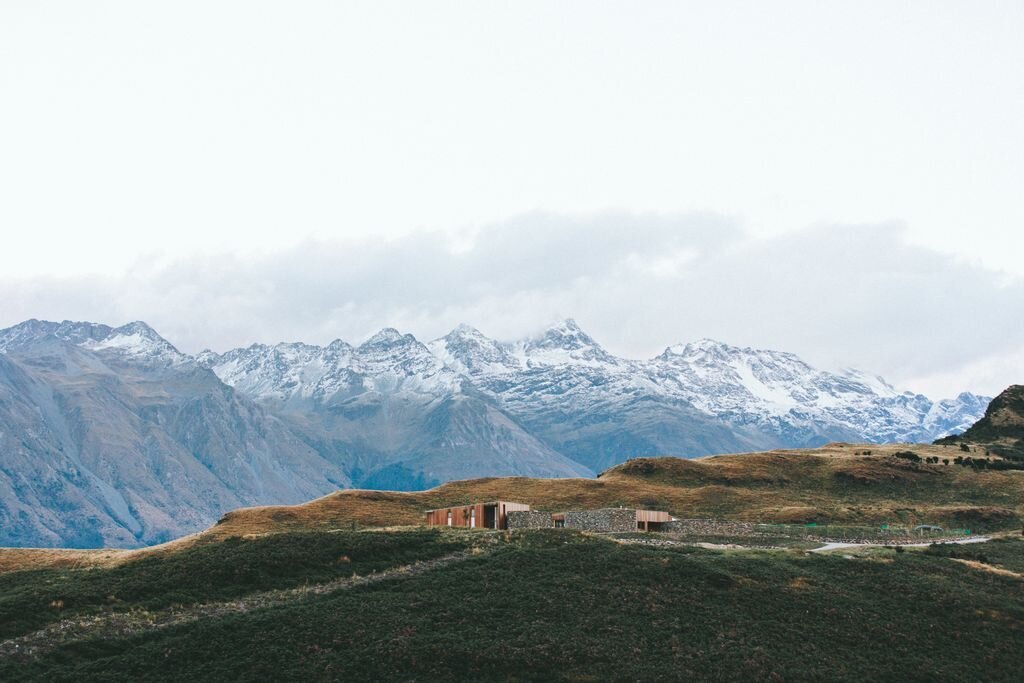
THE HINDU KUSH
RIDING SAFARIS IN PAKSITAN
-
A luxury riding split between two remote aread in the Hindu Kush mountain range. Hosted by a Chitrali Princess, with a masseuse at camp.
-
Includes all accommodation, transfers, meals, horses, guides and entertainment.
-
One of the most scenic flights in the world brings you to the very north of Pakistan. A home for adventure seekers, Skardu offers all kinds of adventure experiences and five star hotel accommodation
-
Experience the best of the area with your hosts that are deeply connected in this borderland
-
The new gold standard for riding safaris. As guests of the influential Noon family you will experience the best of Pakistan. Polo, a mobile safari, hunting with english hounds, a Mughal mansion, classic cars and more!
-
You will stay in your own room at the house, two to a stand-up tent in real beds for two nights at camps and an a new, boutique hotel in Lahore with incredible rooftop views of the city.
